#but it’s weird! assassin’s quest was way better written than this!
Explore tagged Tumblr posts
Text
Hmm. Three chapters in, Ship of Magic is… fun but not good, haha.
#it reads like the work of an enthusiastic but very inexperienced author which is a bit weird#Althea is EXACTLY like every protagonist I wrote about in my notebooks when I was twelve lol#all of the magical world building is quite good but everything else not so much#but it’s weird! assassin’s quest was way better written than this!#is it just the switch from 1st to 3rd person and the moving away from Farseer’s obvious Earthsea influences?#rote blogging
13 notes
·
View notes
Note
omg, I’m so glad that somebody else sees what Jagex did to Zamorak too — I feel like I’m driving myself crazy getting upset about how bad the retcons are because nobody else seems notice or care! :|
Thank you for showing me I’m not the only one so I can stop gaslighting myself into thinking I’m just being unreasonably bitter… (I totally still am.)
You're absolutely not alone in your realization there. If you feel like you've noticed the whiplash that is character 'progression' in RuneScape, chances are it's absolutely there, and also good on you for keeping your eyes peeled and either doing certain quests back to back or reading dialogue transcripts from time to time. The reason most people either don't notice or don't agree with you is because the mods sitting down in the RS discord lore channels are doing a phenomenal job shrugging and going "Eeeeeh you're wrong, we totally didn't do that" or "Agree to disagree" whenever someone brings up the slightest inconsistencies instead of owning it and committing to being better at consistent writing.
I firmly believe that Jagex as a company as well as any of their lore teams never had a character sheet for any NPC in the game whatsoever. Not having a character's logical end goal written down is acceptable - growth, change and development are great things. The problems start where you can clearly tell they don't have the key traits or values that characters believe in discussed or written down anywhere. Their way of 'developing' characters is giving them 180s from one extreme to the next, while always using 'this is the only way!' as justification, whether it's Kerapac or the young god of the week. They also seem to have a weird liking for showing that their current 'fav' is good by demonizing and vilifying other characters, which is bizarre because you can be a 2/10 writer and still be more than adequate at making your favs likeable without having to go the Jagex route and bash another character to make yours look good (The complete bastardization of EVERYONE to make Saradomin look good in comparison was about as subtle as a Barrelchest in a WG's house). Zamorak specifically is such a baffling case. Going from 'the world is worse with Zaros in it, and if no one will remove him, I will', to having a borderline panic attack on his knees clutching the stone of Jas like a stabilizing support wall while the other gods were grilling him about killing Zaros (which, come on, you KNOW Saradomin totally wanted to do and would've if he could!) before nuking Forinthry partially out of the panic and confusion of being cornered like that, to winning the lower classes of Infernus their freedom because damnit they deserve to fight for their right to live, to perfecting the philosophy of wanting to fight to improve your life to this... uh... defeatist attitude? out of nowhere? Sending Khazard to steal an ancient artifact that could turn the tide of a war currently at a stalemate because we're all doomed and there's no sense trying? What? and destroying it because if he's not achieved victory over the Elder threat himself, none of us deserve to fight? Since when? Has he become Zaros's Legatus Maximus by quitting the moment things didn't go his way in combat? Obviously not. So why turn the one character with burning ambition and a will to live glowing as brightly as a newborn star into this sadsack that has to ruin it for everyone else if he can't get his way? Because you want to build Saradomin up as righteous? Because Armadyl deserves more screentime? Because you want him out of the way for when you bastardize Seren next quest before quickly coming back to grill him again? Clearly someone at Jagex ran out of ideas on who to character-assassinate next. And clearly not enough people have told that person to think it through.
Zamorak's not even the only one it happened to, y'know? Remember Kerapac? You know, Kerapac, who in OoaK is the bright, reasonable, genius scientist gritting his teeth through chronic pain to give a fighting chance to others he believe were affected by the selfishness of gods or fate, while respecting others' agency enough not to force them either way (Remember the whole 'Hey Hannibus, if you wanna sacrifice yourself for a chance and a shot in the dark, go for it, but no pressure either way' thing? I do. I remember. I remember that Kerapac before he got ripped away from us and replaced with a lunatic). Then, 2 quests down the line, he controls the needle and time itself and is an extremist who won't listen to reason whatsoever? What was it he said? 'I'm giving you a chance to say goodbye to your loved ones, be happy and take it?' something along those lines? Dude, you control time itself, you have a shadow anima device to force a non-interaction clause from the elders if you play it correctly, and the best you can give us is "It's my way or the highway and if you want any say or rights, f you", when an amicable solution that would've been preferable is "I'll rewind time for a few weeks while you evacuate everyone through the world gate so I can kill the elders in peace and you can return whenever I'm done fighting them if the planet survives" - Kerapac still gets to be reasonable, WG still gets to refuse because no other world has the biome to accommodate all species and factions on the planet, also putting them so close to eachother will just escalate old conflicts immediately and whatnot... But no. Let's make the enslaved guy battling chronic pain the monster while implying he's a monster specifically because he thinks the eldritch horrors enslaving his species deserve consequences. Why not. Oh wait. I'll tell you why not. Maybe because if you don't have anything new, helpful, or carefully nuanced to say about a heavy subject, you shouldn't touch the heavy subject.
#runescape#spoilers#Finally someone actually sent me Runescape headcanons#and the headcanon that Jagex's retcons are stupid is a VERY good one#And I haven't even talked about the Seren 180 uuuuuuuuuugh Jagex please cease#the rest is under the read more for mentioning heavy topics. Also feel free to ask to tag#panic attack mention#slavery mention
19 notes
·
View notes
Note
Vinelle (and muffin since I know they'll see this too~!), I don't know if you guys have made a post ranking the Twilight books and why (including Bree and L&D if applicable) but I'd love to hear your opinions! (also if you could rank the Twi movies from least worst to most worst and why that'd be awesome too! 030 hi key love your rants on the movies and would love to hear y'alls thoughts more on them)-Sw
You’ve caught us out, anon.
And thanks to you, we spent last night watching Breaking Dawn Part 2 so we could rank it. @theoriginalcarnivorousmuffin hadn’t seen it at all, while I half-remembered it from years ago. A terrible time was had because that movie was unwatchably bad.
Since this ask was sent jointly, our answer was co-written.
So, without further ado, movies first:
1. Twilight
This is a bad movie, but it’s recognizably a movie. The scenes are connected, there are things it did well, and we could tell you what the plot is. The awkwardness, for instance, is very well done. The weaknesses are glaring, the main one being that the film never sells us on the characters of Bella and Edward, nor on their relationship, relying instead on the audience knowing they’re in love because- well, they’re in love.
Diving deeper into Edward and Bella, there’s an understandable explanation for this. Edward of the books is terrifying, and I don’t think there’s a translation to screen that could have kept the romantic atmosphere surrounding him that we see from Bella’s point of view.
Bella can listen to Edward eating Biology and how he explains that it means how much he loves her and not blink. An actual audience hearing that dialogue will have second thoughts.
Right out of the gate, Twilight has a very difficult task: Salvage Edward Cullen while still producing a somewhat recognizable character who will take the same actions (or near the same actions) that Edward Cullen did in the book.
In the effort to make Edward palatable but save some of his original character he loses his more terrifying lines (as well as his hilarious ego) but becomes weird, awkward, and vaguely creepy. Edward Cullen of the films is that weird, friendless guy in your high school who you feel kind of bad for but don’t want to eat lunch with.
Bella faces a similar transformation. Bella’s insecurity is completely removed (or else the screenwriters somehow failed to notice it). As a result, we get this strange antisocial girl who is too cool for school because she’s a stuck up bitch.
Between Edward, this creepy guy who sits next to her in Biology, and Bella, this girl who enters school too good for everyone else, we see no reason why they would ever be interested in one another.
In an attempt to make these characters likeable they made them both unlikeable and boring. The film series as a whole never recovers from this (indeed, the quest to make Edward look good keeps leading to stranger and stranger places).
It also forgets to explain why the Cullens live among humans, they’re attending high school… because. It’s a movie that explained to us all those terrible 2010 era memes and “still a better love story than Twilight”. And frankly, those memes were great, better than the movie. Case in point.
Everything is weirdly blue, which is atmospheric but also makes everything and everyone washed out. Everyone is super pale, so you have Mike looking just as vampire-y as Edward. However, it’s recognizably a movie. It introduces the characters, recognizes that the audience needs to be informed of things that are important to the plot, and most scenes are in some way connected to the plot. This is more than can be said for the other films, which is why it lands the top slot.
2. Eclipse
Eclipse earns its second place by process of elimination. The remaining three were worse. Eclipse also features Edward being cuckolded mercilessly, which is hilarious. Oh, and Victoria playing Riley, that was another beautiful scene.
Apart from that it’s just a deeply boring, borderline unwatchable movie.
Special shoutouts go to:
The opening scene of Riley getting turned, a ridiculous and poorly executed scene that served no purpose for the movie whatsoever.
Rosalie dropping her backstory without any context, Bella walks up to her and Rosalie launches into this horrific story for no particular reason. Both her and Jasper’s backstories could have been cut, as they served no purpose to the story and felt really thrown in there.
The many, many redundant scenes. The Victoria chase that ends with the Cullens and Quileutes squabbling could have been cut entirely. So too could the Seattle subplot with the newborns and Bree.
It’s a movie that isn’t about anything in particular, so it throws subplot spaghetti at the wall to see what sticks. It dutifully regurgitates the Jacob/Bella/Edward love triangle while also trying to convey that Bella’s about to lose her mortality, while also trying to introduce suspense and excitement with the newborns. It fails to execute either of these, and it also fails to tie them together.
3. New Moon
The movie that wanted to skip itself.
This movie had two jobs, show that Bella is depressed when Edward leaves and convince the audience of Bella and Jacob’s strong friendship. And apart the rotating shots and the occasional Stewart voiceover, the former becomes one of those “just stay with us on this one, guys” failures, and the second is failed on every level. Jake and Bella are much closer at the beginning of this movie than they were in canon, and a montage of Bella hanging out with her buddy is just that, it’s a montage of Bella hanging out with her buddy. It speaks volumes that Stewart’s voiceover has to remind us she’s depressed and Jacob is helping her heal, because there’s no indicator on screen that this is happening.
This, in turn, makes Bella/Jake as weak and unconvincing as Bella/Edward was in the previous movie. We just have to take on faith that these people are important to each other because that’s what we’re told.
There’s also the wolves, who are completely butchered. In the books, there’s this great mystery with bears in the woods, there’s Bella wondering why Laurent ran off, there’s build-up, then when we find out what’s actually been happening it’s a satisfying explanation, all the pieces come together really nicely. This is not the case in the movie. Meeting the pack is just weird in this context, because we never wondered who they were. Bella is randomly invited to breakfast, we meet Emily with the scarred face who won’t ever have a line again, and that’s it, these characters don’t become important to the movie in any way. It’s a pointless scene that could have been cut, much like so many other scenes in these movies.
Apart from that, the Volturi scene from the books is butchered so I hardly recognize it, and Alice, Carlisle, and Edward’s characters are assassinated to an impressive degree considering they were barely in the movie.
It was hard to watch.
It lands third place because somehow, Breaking Dawn was worse.
4. Breaking Dawn Part Two
I’ll just list the positives: the intro was very pretty and promised a better movie. It was also long, which we appreciated because it took away from the movie’s runtime. (This is not at all an exaggeration, a lot of the time watching all five movies was spent looking at the remaining runtime and groaning.) The Tommy Wiseau sex scene in the sex cabin was uncomfortable, but the fact that it would have fit perfectly in The Room made it funny. The Romanians were genuinely, unironically, great, because of all of Carlisle’s trashy friends, these were the only ones the movie didn’t try to convince us weren’t trashy.
This movie ranks above Breaking Dawn Part One because of the things listed above.
Apart from that, something all of these movies, but especially the last four, suffer from is that they don’t have plots so much as they have a check list of things to put in the movie before they can call it a wrap. This movie is the worst offender of that, and it’s made worse by the film’s expectation that the people are fans who already know what’s happening, and therefore don’t need anything explained. I’ll explain what we mean by that.
We get Bella waking up a vampire, and absolutely nothing is explained. If you don’t know what happened in the last movie then fuck you. Bella then goes hunting, we get the hiker, we get the mountain lion, she goes back to meet Renesmée, finds out Jake imprinted on her daughter, we get the sex cabin, the handwrestling with Emmett. The Charlie problem is introduced (poorly), only to be solved a scene later with emotional payoff that had absolutely no buildup. All of these things, and the rest of the movie as well for that matter, feels like we’re just crossing items off a list.
Since the audience is expected to already know the story, the story only bothers to explain about half of what’s happening, if half. Who’s the lady living with Charlie? If you don’t know, don’t worry because it’s not important anyway. When did Kate and Garrett fall in love? If you don’t care, that's understandable, because they’ve barely interacted in the movie. Who are the Amazonian women? Do they have names? Don’t worry about it. Did Alistair actually leave, if so did that have an impact? Well, Bella stared at a window for a few seconds.
Every so often the characters will start quoting the books, and it’ll be completely out of place because these movies veered off course long ago. Carlisle references his great friendship with Aro, a friendship that was only briefly mentioned at the beginning of the second movie. Aro randomly starts talking about how scary human technology is.
All of these scenes feel like Marcus is telling the story, he’s just listing events waiting for the story to be over, and forgets a lot of pertinent details because he doesn’t care enough to remember them. There’s no effort to tie these scenes together, no effort to build up to anything.
There’s also one significant failure, and this is a failure shared by all five films, but it affects the plot (I use the term “plot” loosely) of this movie which is why it gets a special shoutout here. Vampires in these movies look human. The fact that Bella has to ask Edward is Gianna the secretary is human says it all, because in the books you know instantly, there’s not even a question. This makes the Charlie subplot ridiculous, because Bella looks and acts the same as ever. She had a trashy makeover, maybe, but she’s still Bella. Watching her get human acting classes after we watched her act perfectly human is just silly. Now, we’re all for suspension of belief, but this movie just pencil drew a moustache on her and the audience is supposed to go “My god, Bella, I didn’t recognize you!”
We then get to the atrocious fight scene, which was somehow worse than I remembered. It was also oddly long for a giant fake out. This scene took significant run time and it turns out to have 0 effect on the plot. And when we get back to the real world, the tonal shift is extreme. You can’t go from Jane being choked, dragged across the snow and face eaten by a wolf to her standing around chilling. We could have skipped it entirely, just had Alice touch Aro’s hand, and he goes “Ah, I see, cheerio.”
The end credits were pretty funny, “here are these random characters with bit parts in previous movies, isn’t this nostalgic?”. Nice try, movie. The fact this came after an extended clip show of the great romance of Edward and Bella, through blurry montage images that failed to be convincing in their original films let alone this one, just made it even more hilarious. Hope you didn’t completely ruin the director’s career, though honestly you should a bit.
5. Breaking Dawn Part One
As you can probably tell by the above entries, the fact that this is the worst one is really saying something. All the movies were hard to watch, but this one required pure strength of will to power through.
The big issue is that Breaking Dawn shouldn’t have been split in the first place. However, it was, and that meant that we got a movie that was almost entirely filler. (Followed, somehow, by a movie that was also largely filler.)
We get everybody preparing for the wedding. What do Mike and Jessica think of Bella and Edward getting married? What’s that, you don’t care? Well, now you know anyway. We get the full wedding, as in the whole fucking thing, including the afterparty. We get Bella and Edward traveling to their island, and there’s filler in the filler where they go clubbing in Rio. We then get every minute detail of the wedding night followed by every minute detail of the honeymoon.
There’s fanservice, and then there’s this. This was live action fanfiction.
NOTHING that in any way is relevant to the story happens, the closest we get is Irina looking stoned. Too bad the Denali’ refusal to help out in Eclipse was cut from the last movie, in fact I’m not sure they were mentioned at all previously in these movies (I think maybe Edward had a one-line reference in Twilight?) so this means nothing to people who haven’t read the books.
We then get to the pregnancy arc, which could have been Rosemary’s Baby but is instead as outrageously boring as the first half of the movie was. The director must have realized as much, because he gives us Jacob’s alpha plot that should have been cut from the movie (yes, I know it was in the books, but the thing about adaptations is that things have to go. For the record, I think Meyer should have cut it too). That subplot was straight out of an anime, by the way. Jacob claiming his ancestral rights as alpha while listing off his titles and the soaring music, was… every shounen anime, ever. Complete with the shitty voice acting.
It was a soul-crushingly boring movie.
-
Something that screws over the last four movies is that they were made to feed the fangirls, and generate revenue because the producers knew the fans were coming to watch the books they liked come to life, so they just had to throw scenes from the books and into the movies and let the magic happen. This is a terrible way to adapt something.
Special shoutout too to having to watch Taylor Lautner run around shirtless in four out of five movies. That was very uncomfortable and none of us needed that in our lives, Lautner included.
Super special shoutout to the fact that we disagree with nearly all the casting.
And this isn’t the post for that, but all of the characters were butchered. Some more than others, and some more insidiously than others. It’s the big things, like Carlisle’s character being turned on its head since he thinks all vampires are damned, exactly the opposite of what he thinks in the books, and the little things, like Jasper and Bella being buddies who bicker fondly in New Moon.
Then the books:
1. Midnight Sun
HANDS DOWN. This is easily our favorite thing to come out of the entire Twilight franchise.
Edward is every kind of crazy at the same time, all the time, and it makes every single sentence packed with delirious entertainment. Reading this book is having a stroke, a psychotic episode, and watching five different true crime shows all at once. We adore every letter of it. (That’s no exaggeration, we even laughed about Edward capitalizing “Son” when Carlisle refers to him as “son” in conversation.)
The book was more than we’d dared to hope for, one of those rare books that makes you go “This was written just for me.”
2. Twilight
The one that started it all.
Vampires are wonderfully creepy. Things like Bella staring at Carlisle acting like the mundane town doctor shortly after learning just how old he is, Alice explaining how vampires kill all, and the uncanny valley perfection of the Cullens all add to the otherness of these vampires, and the general atmosphere of the book.
The love story is convincing. Edward seen through the eyes of Bella is wonderful, the red flags are there but if it weren’t for the books that followed we wouldn’t have decried the ship the way we do.
3. Eclipse
Breaking Dawn is the more interesting book, but Eclipse has less things we outright don’t like. We get to know all the characters better, Edward and Bella are their usual beautiful selves, and it’s overall peak Twilight.
4. Breaking Dawn
Would have ranked much higher, we like what it did. Without it we wouldn’t be in this fandom now, as it brought so much amazing content. The baby plot is fine by us, Carlisle’s friends are great, the Volturi confrontation is a beautiful, if bleak culmination of preventable events. There’s a lot of great stuff in this book.
Unfortunately, and there’s just no diplomatic way to put this, so I’ll just come out with it: there’s too much Jacob.
He no longer had a reason to be in the story, given the way Eclipse ended he had every reason not to be in it. In spite of that we get an entire third of the book from his point of view, and then damned if he’s not shoehorned into the last third as well. He added absolutely nothing to the story, he was just there taking up space and being possessive of a toddler. His POV section was tough to get through, and his presence in book three was just painful. He should have been cut.
5. New Moon
This was the book we had to power through. There are some very good things in it, most notably the Volturi scene, but the Muffin and I enjoy Twilight for the vampires, and that makes Laurent and Hallucination!Edward the highlights of the part of the book where Edward is gone.
There’s also the fact that Jacob isn’t a very compelling character. He has to carry the book now that the Cullens aren’t doing it, and he simply isn’t up for it.
-
Yes, we’re aware that these books are ranked according to how much Jacob is in them. We don’t even hate him, not at all, it’s just that he’s boring.
(That being said, the books at their worst are better than the movies at their best. Jacob narrating his perfect playdate with Renesmée would still be preferable to… I’m trying to think of a good scene from the movies. Hm, nevermind.)
As for The Short Second Life of Bree Tanner and Life and Death, only I have read Bree Tanner and I don’t remember it well enough to give a proper assessment. I was bored with the OCs, though, bored to tears, throughout that book I was itching for Victoria and the Cullens. We have not read Life and Death, but we’re offended by its existence so it ranks bottom.
#books vs. movies#twilight movies#twilight books#the twilight saga#twilight renaissance#twilight meta#twilight#movie review#twilight review#i'm using all the tags tonight#the carnivorous muffin#thecarnivorousmuffinmeta#Anonymous#ask#long post
109 notes
·
View notes
Text
Igniting the Fuse
A fic for @zutaraweek
Summary: Zuko can’t stand Katara’s obvious contempt towards him. Determined to fix their relationship, he asks Aang and Sokka for help, who, in turn, devise a series of team building exercises with the intention of sparking friendship between the water bender and the banished Prince. They hadn’t anticipated sparking something more. Pre- (and post-) Southern Raiders. Zutara.
Available on A03 and FanFiction.net.
Prompt: Loosely inspired by the prompt “Fuse” (Zutara Week 2020) Genre: Romance/Humour Words: 4293 Disclaimer: I do not own Avatar: The Last Airbender or any of its characters.
A/N: Hi! Please accept my humble offering to the ATLA fandom for Zutara week. :) I’ve only ever written fics for the Naruto verse, but I just finished ATLA last month and have been fangirling about Zutara and the Gaang dynamics ever since. When I learned that Zutara week was just around the corner, I just knew I had to write something. Enjoy. :)
***
Igniting the Fuse
Now that he was part of the group of vagabond do-gooders (who he used to think were his sworn enemies), Zuko felt a sense of contentment and purpose like he’d never felt before.
It had been an excruciating uphill battle filled with awkward encounters and blows exchanged to finally convince them that he was on their side. But he’d persevered because Zuko just knew he was destined to be here, with them, to support their quest of defeating his father.
Thankfully, in the end, they accepted him.
Well, all except for the water bender, that is.
Katara, the last water bender from the Southern Water Tribe, who had the biggest heart and kindest smile that Zuko had ever seen, utterly despised him.
She made no effort to hide this fact, with how she always sat as far away from him as possible, sneered at his (attempted) jokes, and ignored him point-blank whenever he spoke.
As the Fire Nation’s banished Prince with a prominent scar on his face marking him as such, Zuko wasn’t unfamiliar with this type of treatment. But what made it different with Katara was that (a) she was avoiding him out of pure dislike – not fear (hell, he’d faced her in combat before and knew she could hold her own against him), and (b) it was Katara.
Why did it have to be her who hated him, of all people? She was level-headed, compassionate, and strong, in other words, she was an embodiment of everything that Zuko wished he himself could be.
And, not to mention, she was rather easy on the eyes and nice to be in the presence of (though, of course, Zuko would never dare admit this out loud).
Perhaps the worst part of all of this was that Zuko knew her hatred was justified. After she’d let her guard down in the catacombs of Ba Sing Se by confiding in him and offering to use her few drops of sacred water to heal Zuko’s scar (a gesture that Zuko would never ever forget), Zuko had responded by siding with her enemy and trying to kill her.
So, yeah, Katara had every right not to trust him ever again.
But that didn’t mean Zuko wasn’t going to give it his best shot anyways. After all, he was a changed man now. He was determined to reconcile for his sins. Earning Katara’s trust wasn’t just something he wanted – it was something he needed to fulfill his personal quest for redemption.
Not that Zuko had a clue where to begin.
After numerous fruitless attempts to force an interaction with her around camp like some school boy trying to get a girl’s attention, Zuko realized he needed help fixing his relationship with Katara.
He cast a wistful glance at Katara’s tent before turning towards the sea, where Aang and Sokka were currently fishing.
Zuko sighed and ran a hand through his shaggy, black hair. Despite being a little weird, Aang and Sokka were the most helpful sources of information around, with one of them being Katara’s brother and the other being, well, the Avatar. So he slipped off his shoes, hiked up his pants, and waded out to meet them.
Their fishing tactics were a rather theatrical sight, with Anng literally blowing fish out of the water with some air bending technique and Sokka spearing them as they flung into the air.
Zuko cleared his throat.
Aang, who was wearing nothing but his orange underpants, beamed at the sight of him. “Zuko! Have you come to help us fish?” he asked. “It’s not really my thing, but Sokka needed a hand.”
Zuko shook his head, folded his arms, and proceeded to explain his dilemma. The other boys listened attentively.
“Have you tried being, well, nice to her?” Sokka asked with raised eyebrows. “Katara likes everyone. It shouldn’t be that hard to get on her good side.”
Zuko rolled his eyes. “Of course I’ve tried being nice! But I guess I just suck at it.”
After a moment of deep thought, Aang’s eyes lit up. “I’ve got it!” he said, clapping his hands together. “We’ll do team building exercises to foster trust. When Katara sees that you can trust each other, I’m sure she’ll like you more.”
But Zuko wasn’t entirely convinced. “This isn’t Air Temple preschool, you know,” he grumbled.
“No, no, I think Aang’s onto something here,” Sokka said with a smirk. “No offense dude, but your social skills suck. Structured ice-breakers are exactly what you need.”
“What? My social skills don’t suck!” Zuko shot back, but Sokka just shook his head, still smirking.
Then, in a deep, mocking tone, Sokka said, “Hello! Zuko here. I sent an assassin after you. Can we be friends?”
Aang covered his mouth to stifle a laugh.
Zuko’s eyebrow twitched, his face burning. “Okay, fine. Let’s try your stupid team building then.”
“Great!” said Aang. “Let’s start after lunch. We’ll handle everything Zuko, so don’t you worry about a thing.”
***
In an effort to gain Katara’s support for their day of team building, Aang and Sokka selected an activity that she was sure to enjoy for the first exercise: surfing lessons – an activity that was, quite literally, right in Katara’s element.
It wasn’t a bad idea, Zuko admitted and side-eyeing Katara’s enthusiastic response to Aang’s proposal of the activity. Her blue eyes were brighter than he’d ever seen them.
Shortly after, the four of them, with the additions of Toph and Suki, were gathered around the shore, with the girls in their swimming attire (cropped shirts and shorts for all but Katara, who wore a white skirt overtop) and the boys in their shorts. Then, Sokka explained that there would be no surf boards.
“No surf boards? How’s that supposed to work for surfing?” Toph asked, voicing Zuko’s concerns.
Katara stood, a smile on her face. “I’ll bend the water to make you float – you’ve just got to balance,” she said. Toph raised her eyebrows and crinkled her nose and Zuko made every effort to refrain from making the same face.
The water bender proceeded to demonstrate. With her feet pressed to the rolling waves as if she were on a solid surface, she jumped and glided in a shower of water droplets, her arms outstretched, like she was sliding through snow or sand. In a way, it looked like she was dancing, Zuko observed, and he wondered if he could really do that too, so effortlessly.
The demonstration came to the end and Katara approached the group. “All right – who’s first?” she asked cheerily, while wringing water from her thick, brown hair.
Zuko avoided eye contact.
“I’ll go!” Suki beamed and hopping to her feet.
And said Kyoshi warrior, despite not being a water bender, made it look rather easy too, in Zuko’s opinion, his confidence boosting ever so slightly. Suki jumped and twirled on the water, laughing the entire time, clearly having a blast. Sokka wolf whistled as Suki neared the shore at the end of her turn. She met his eyes and blushed before leaping into his arms with a big smile.
Zuko watched the interaction from the corner of his eye and wondered if he could ever get Katara to feel that comfortable around him.
Yeah right.
Aang went next and he glided over the water with ease (though it was hard to tell if he was truly surfing or floating over the waves with air bending). Even Toph took a short turn, despite her obvious discomfort over being parted with solid ground.
“Zuko’s turn!” Aang exclaimed after everyone had gone, like he was afraid Katara would forget about him.
Zuko caught her gaze and was met with an icy stare. More like she doesn’t want me to have a turn.
He got to his feet and sloshed through the shallow water before turning to the group in anticipation.
With mixed emotions, he noticed that Katara was smiling at him now, her eyes bright once more. What’s with the sudden mood change? he wondered while returning the smile with much hesitation.
Then Katara raised her arms and he was off.
“Whoa!” he gasped, arms outstretched for balance, while the water carried him upwards and backwards, towards the sea. He pivoted and widened his stance for stability, while he adjusted to the strange sensation of a rapidly rolling current against his bare feet, and his total loss of control over where he was going.
Despite this, before long, Zuko began to relax, leaning into the waves’ winding motions, feeling a thrill with each dip and jump, as he climbed higher and higher and farther out to sea.
And then – SPLOOSH!
Like a rug being tugged from beneath his feet, the water supporting Zuko vanished, falling back to the sea – along with said fire bender.
He fell into the water in a rather undignified manner, limbs flailing. When he came up for air, spluttering, to his displeasure, just about everyone was doubled-over laughing.
Zuko gritted his teeth as he swam towards shore, glaring at the mischievous water bender.
“Oops,” she said with a shrug, though she didn’t look the least bit sorry.
Well that was a flop… literally, Zuko thought with a grimace as he trudged along the beach and shook water from his soaked hair.
Aang had the decency to try to look apologetic though tears were streaming down his face.
***
“The next activity better not end like that,” Zuko hissed when the boys regrouped. “How about we try something where she has to trust me this time? Because clearly the other way around doesn’t work.”
“Hm. Maybe you can teach everyone something. What are you good at Zuko?” Sokka asked.
“Fire bending.”
“Well, you can’t exactly teach everyone fire bending.”
“Oh, I know!” Aang piped up. “Zuko isn’t a bad dancer. He nailed the Dancing Dragon formation.”
Zuko dismissed the suggestion immediately. “That wasn’t a dance! And you’re out of your mind if you think I’d ever teach dancing lessons.”
A moment of silence passed while all three boys contemplated their next move.
“It’s probably best if I don’t hire another assassin and like… save her from it. Right?”
“Yes, Zuko. Best we table that idea.”
***
Zuko felt a little more confident about the second activity that Aang and Sokka planned for the group.
“We’re going rock climbing!” Aang exclaimed and gesturing to the ropes and makeshift pulleys he and Sokka had fastened to the cliff side earlier. For the most part, in Zuko’s opinion, this activity far exceeded the last because he and Katara would be on relatively even footing as far as their bending was concerned.
“Everybody partner up!” Sokka instructed. “I call working with Suki!”
“And I call Toph!” Aang shouted, which garnered suspicious looks from both Toph and Katara. “I thought we could work on our teamwork?” he added to the earth bender sheepishly.
Toph smirked. “Whatever you say, Twinkletoes. Gosh, I’m popular, huh?”
Through narrowed eyes, Katara directed her attention to the person she was evidently stuck with.
Zuko tried his hardest to seem friendly, though he was suddenly uncharacteristically nervous. “You can go first, if you want,” he offered.
Katara lifted an eyebrow. After a moment, she said, “All right then,” and turned towards the cliff, her braided hair flipping over her shoulder as she did.
The rock climbing ensued, with Toph practically flying up the wall while she bended parts of the cliff side to jut out like stairs. Momo was doing quite well himself from a little further down, not even holding onto the rope, though Appa dutifully spotted him anyways.
Despite not having any distinct advantages, Suki flourished in this activity too, scaling the wall like a ninja. “Atta girl, Suki!” Sokka cheered on from below. She responded with a glowing smile at her rock climbing partner.
Zuko turned his attention to his own rock climbing partner, who was faring well, though not quite as well as the other climbers. Her movements were a little clumsy and she clung to the rope and handholds like her life depended on it. After all, with each step she climbed, the water bender ventured farther away from the comfort of the sea behind them.
There was no way Zuko would let her fall though, considering the death grip he had on her rope. He needed to prove he was the most trustworthy rock climbing partner she could ever have.
Taking a page out of Sokka’s book, Zuko decided to egg his partner on. “You’re doing great!” he called.
Unfortunately, his comment prompted an icy glare. “Are you mocking me?” Katara snapped, as she freed her blue sleeve from a protruding twig that had snagged it.
“No...,” Zuko snarled through gritted teeth.
This is impossible! I can’t even compliment Katara without her getting mad!
She proceeded to climb in silence without sparing him a glance, and Zuko couldn’t think of what to say, so he just sighed and frowned in her general direction.
How on earth was this activity supposed to bring them closer together now?
She’s probably clinging to the rope for dear life because she doesn’t trust me to stop her from falling, Zuko thought with a scowl.
But then he was struck with a brilliant (and morally questionable) idea.
What if Katara’s rope were severed… for some reason… and Zuko caught her?
Now, Zuko was no expert, but saving someone from falling seemed like the ultimate gesture of trust if you asked him.
Surely Aang and Sokka would disprove if Zuko deliberately severed Katara’s rope, but she was maybe only twenty feet up – so surely, even if she did fall, she’d survive.
Before Zuko had properly thought through his plan, he’d sent a barely discernible fireball – no more than a small collection of sparks – up the cliff side. It went undetected by the others, who were focused on their rock climbing tasks.
With the softest of hisses, the fire made contact with the rope about ten feet above Katara’s head. The rope began to fray immediately but no one seemed to notice. Until –
“Whoa!” Katara exclaimed as the rope started to give. She clawed for the nearest handhold and gripped it firmly while looking around with wide eyes.
Now, Zuko thought, dropping the rope and racing towards the cliff.
By now the others were catching on to Katara’s predicament.
“Oh no, careful Katara!” called Aang.
“Hold on!” cried Suki.
“Just drop!” Zuko shouted from below, his arms outstretched. “Don’t worry – I’ll catch you!”
Katara peered down at him, like she was mentally calculating the risk of doing what he asked. When she met his eye, Zuko felt a swell of anticipation for a reason he couldn’t quite place.
Then, something determined entered Katara’s eyes and she directed her gaze beyond him, towards the sea.
The rope snapped and Katara began to fall.
Zuko braced himself for the impact, his arms at the ready.
I won’t let you down!
And then – WHOOSH!
Zuko faced an impact but it wasn’t the one he was expecting.
An aggressive current of water slammed straight into Zuko’s legs, knocking him off his feet.
“What?” he gasped as he lost his footing, toppled sideways, and fell to his back. Spluttering, he watched in disbelief as Katara bended a neat stream of water through the air, stepped into it, and directed it towards the ground to safety. She landed beside Zuko with a splash – soaking him from head to toe.
Katara straightened up and regained her composure, brushing off the front of her blue dress, as the water drifted back out to sea.
She turned to Zuko like she was just noticing him for the first time. “Oh!” she said while extending her hand. “You okay down there?” she asked, eyebrows raised and the slightest mischievous glint in her eye.
Zuko accepted her offer to help him up, but didn’t have it in him to celebrate the kind gesture – he was far too embarrassed and couldn’t meet her eye.
As soon as he was on his feet, he retreated and stomped away. “I’m fine,” he growled while shaking water out of his hair for the second time that day.
***
“The next team building exercise will be different. We’ll use our words this time,” Aang decided during a brief rendezvous with Sokka and Zuko.
“What’s that supposed to mean?” Zuko asked, eyebrow raised.
“You’ll see – I’ve got a plan. Just make sure you’re sitting beside Katara when we gather round the campfire after dinner. Trust me.” He patted Zuko’s shoulder and flashed him what he probably thought was a reassuring smile, but given their track record with team building exercises thus far, Zuko didn’t feel so confident.
“Fine,” he said anyways because he didn’t have anything to lose.
***
True to his word, after the sun had set, bellies were full, and Aang had summoned everyone to the campfire, Zuko claimed the spot beside Katara, even though he had to wrestle Toph in the process of squeezing in between them.
Katara gave Zuko a weird look and motioned to get up.
He grabbed her sleeve. “Wait – stay here,” he said before he could think better of it (and immediately regretting the motion).
She startled and opened her mouth to respond, but thankfully, Aang chose that moment to command everyone’s attention and start the activity. Zuko released a breath.
It turned out the activity was rather simple. Each person was required to share a compliment about the person on their right – and once everyone had a turn, they were to repeat the exercise in the other direction.
Zuko was skeptical about the cheesy activity having any effect on his relationship with Katara but he figured he might as well try.
He frowned and glanced at Katara, who was on his right, noticing the firelight dancing in her blue eyes. He would have to share a compliment with her first.
I’ve got one shot so I need to think of something good, Zuko mused while absently bending the flames from the campfire into little loops.
His first thought was to comment on her water bending, which was quite good as far as he’d seen. But would that just remind her of the times she’d used her water bending against him?
Then what could he say about her to get her to like him?
It was Sokka’s turn to pay a compliment to Suki.
He turned to the brunette Kyoshi warrior with a wide smile and an arched eyebrow, and said, smoothly, “Suki, you are as radiant as the sunset.”
Suki’s face lit up and her lips curved into a shy smile. “Oh, Sokka,” she sighed and shoving his arm lightly, in a friendly, teasing manner.
That’s it! That’s the reaction I want from Katara, Zuko thought, his chest tightening at the very prospect of it, but would complimenting her physical appearance have that effect on her? He wasn’t sure.
By the time Zuko tuned back in to the activity, Aang was telling Toph that she was the most terrifying girl he’d ever met.
Zuko watched the exchange in anticipation for surely the earth bender would take offense to the remark. But instead, she punched Aang’s arm and beamed. “Thanks, Twinkletoes!”
Would Katara want to be called terrifying? Honestly, Zuko thought she was the farthest thing from terrifying (unless she was really angry). No, Azula was terrifying. And Katara was… well, not like Azula.
Toph turned to Zuko next, gazing up at him with a cheeky smile. “Oh, this is easy. Thanks for the entertainment in the water today. I haven’t laughed that hard in weeks!”
Zuko bristled with anger for a moment, but when he realized everyone was chuckling, and he remembered that he would much rather them find him funny than evil, he swallowed his pride and smiled. “You’re welcome,” he mumbled.
“Okay, Zuko’s turn!” Aang prompted, and then, suddenly, everyone was starting at him expectantly.
Zuko swallowed. “Okay,” he said before turning towards Katara, whose arms were folded and was watching him from the corner of her eye.
Here goes, Zuko thought. He said the first thing that popped into his head, inspired by Sokka’s earlier success.
“You’re… as beautiful as the… ocean?”
Now, Zuko wasn’t sure what reaction he was expecting, but, strangely, no one seemed to react at all. In fact, the entire group was eerily silent, their eyes trained on him, including Katara’s.
Suddenly, Zuko felt nervous. I did something wrong, didn’t I?
He turned towards Sokka for support, but only then, to Zuko’s horror, did he notice that Sokka and Suki’s hands were clasped together.
Is Suki his… girlfriend?
That hadn’t occurred to Zuko, honestly. He’d dismissed the idea because surely Suki was too good for the guy.
But maybe he was wrong. Maybe they were so close because they were dating. And maybe, by mimicking Sokka’s behaviour, Zuko had inadvertently suggested that he wanted to date Katara.
He felt his face heat up.
I could use some of Uncle’s calming tea right about now.
Then, Katara was on her feet. She avoided eye-contact when she growled, “Really? Don’t have anything to say about my abilities, do you? I’m just some damsel in distress to you, huh?”
And then she stormed off, effectively ending the team building exercise. Zuko pinched the bridge of his nose in frustration.
I should have just called her terrifying.
He followed her.
***
Katara was perched on a rock near the ledge of the cliff, overlooking the sea and star-sprinkled night sky. She was hugging her knees and her shoulders were slumped.
Zuko approached with caution. “Hi,” he said when he was within earshot.
Katara glanced at him and turned away quickly.
He sighed.
Why do I suck at everything?
“Um, let me try the compliment thing again,” Zuko mumbled, not sure how much Katara was paying attention to him but going for it anyways. “My uncle taught me how to control lightning using the principles of water bending. I never really thought about water bending much, but since then, and since I saw what you can do, now I appreciate it more. It’s a… beautiful ability. And it’s strong. Like you.
“And that’s… what I’m trying to say.”
Katara glanced at him again, and to his relief, there was something kinder in her eyes.
This encouraged him to continue. “And I’m sorry for everything I did before. Please tell me how to make it up to you because I’m trying but I don’t know what I’m doing.”
After a moment, Katara’s lips curled into the smallest of smiles. She turned towards the sea. “You could reconquer Ba Sing Se in the name of the Earth King. Or bring my mother back,” she said sadly with a humourless chuckle, like what she was proposing was ridiculous. She buried her face into her knees.
Later that evening, after a brief consultation with Sokka about the story of his mother’s death, Zuko made plans for what would end up being the most effective team building exercise yet.
***
Many days later, Zuko found himself standing on a dock overlooking the ocean and a sunset painting the sky a glowing medley of pinks and oranges.
He had just returned to camp after a long trek with Katara to track down her mother’s killer, with the intention of executing revenge, but Katara ended up sparing him in the end – while still finding the closure she needed.
Zuko had learned more about Katara’s motivations and abilities on the trip, including her impressive repertoire of water bending feats.
To put it frankly, Zuko had no shortage of compliments to give her if they ever played that campfire circle game again.
And now that he understood Katara better he was filled with hope that maybe, just maybe, she didn’t hate him anymore. Though he wasn’t completely sure.
Katara was sitting at the end of the dock with her toes dipped in the water. Aang was beside her and speaking about the importance of forgiveness.
She got to her feet and faced the two of them. “Thanks Aang, but I didn’t forgive him. I’ll never forgive him.”
And then she turned towards Zuko, a smile blossoming on her face. Zuko’s breath caught in his throat.
“But you,” she said and drawing closer, “I am willing to forgive.”
Before he knew quite what was happening, Katara pulled him into a tight hug. Zuko was startled at first – hardly able to believe what was happening.
I did it! he thought in awe, thinking back to how envious he had been of Suki jumping into Sokka’s arms on the beach.
He smiled in spite of himself and returned the hug with equal enthusiasm, his heart racing.
But then, abruptly, Katara retreated. She stared at Zuko from a short distance away, looking positively radiant in the light of the sunset. A strange expression crossed her features. Embarrassment? Anxiousness? Zuko wasn’t sure. But then –
“I’m not flirting or anything, you know,” she said.
Not… what?
Katara seemed to remember that her hands were still on Zuko’s shoulders and pulled them back quickly. “I forgive you and that’s – that’s it!”
Zuko was still processing her words when she scurried past him, down the dock.
He gaped at her retreating form. “What was that about?” he asked.
Aang, who had been hanging back from the exchange, approached. One of his eyebrows was distinctly twitching. “Well, after the team building exercise around the campfire, everyone thinks that you… well, you know.”
Oh.
Zuko put his head in his hands, face burning. Something told him he was going to need a lot of help, and maybe even a new round of team building exercises, to figure out this new development in his and Katara’s relationship.
#zutara week 2020#zutara week#zutara#zutara fanfiction#atla fanfic#zuko#atla#wolf08fic#my first atla fic#loved every second writing this
87 notes
·
View notes
Text
Book Review - Summer Summary 2020
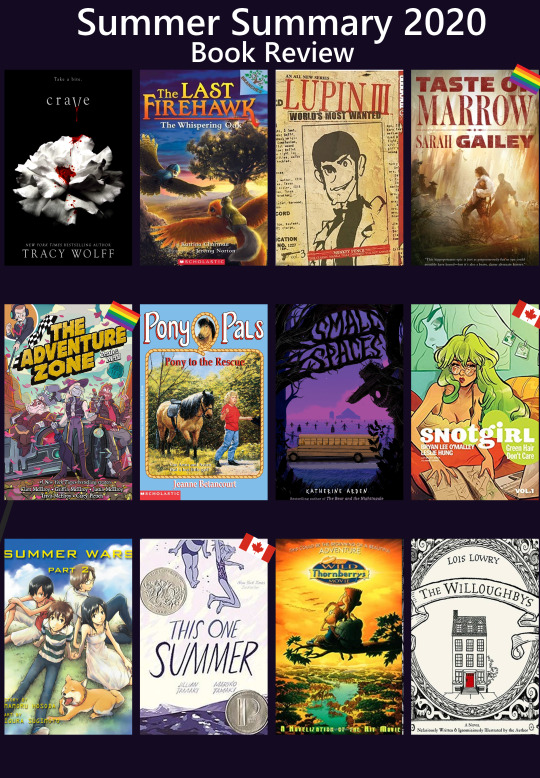
I didn’t get around to doing an individual post for the books I read in June/July/August, so I decided to choose a dozen that I read over the summer... I’d separate the wheat from the chaff for you so to speak. Though like you’re about to find out, that doesn’t necessarily mean they were all good by any means...
Crave
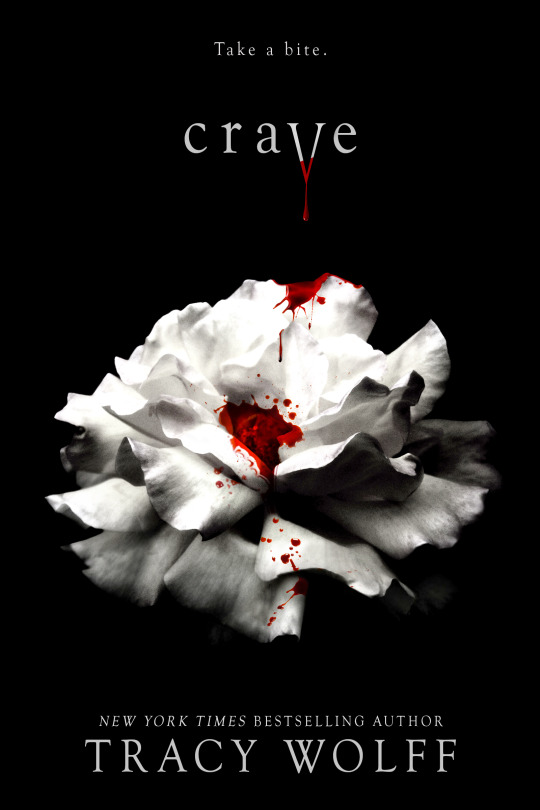
My girlfriend got this for me to “tide me over until Midnight Sun”. Between you and me, I think she was taking the piss. Anyway, Crave is very... standard fare paranormal YA school romance with the added flare of being written by an adult erotica writer, meaning the rhythm and tone of this novel is fucking bonkers. If you want to read the novel without reading the novel, just take Twilight and the entire Vampire Academy series, shove them in a blend, and force down the sludge you get from that. Normal Average Girl Goes To Secret School In Alaska For Vampire, Werewolves and Dragons. That’s this book. It is so big and so so so bad. I finished it out of spite, please don’t do that to yourself. Unless you are really craving (hurr hurr) some top tier trashy paranormal romance, in which case... no judgment.
The Last Firehawk

The Last Firehawk is a Scholastic “Branches” series, written for beginning readers (grade 1-3ish, depending on the child’s reading level). It has short stories, big text, and awesome pictures on every page. Guys. I unironically am adoring this series. It’s simple and is introducing children to a number of classic elements in the fantasy quest genre, but it is so charming. Friends Tag and Skyla discover a firehawk egg, and species that is supposed to have disappeared long ago. When Blaze hatches from it, the three are tasked with going out and finding the magical ember stone which was hidden long ago by the firehawks and which could be used to defeat the evil vulture Thorn and his dark magic... I read the first two books to second graders who ate it up and read the next four books because I personally wanted to continue the series. If you have young readers in your life (or just want a fun kid adventure) then please try these they’re the literary equivalent of nibbling on a chocolate chip cookie.
Lupin III: World’s Most Wanted #3
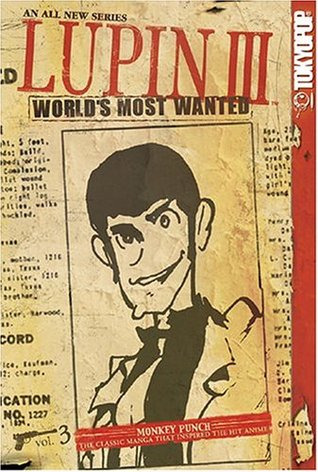
All the kind people that still follow my tumblr and haven’t tried to murder me because of my Lupin obsession are not going to be surprised by this one. I finally read one of the manga for this series and honestly I’m delighted. Somehow even hornier than the show, but hilariously funny. I felt like I was reading a more adult version of Spy Vs Spy. It’s a bunch of short, individual bits/adventures with lots of visual gags and an artstyle that is really different and delightful.
River of Teeth / Taste of Marrow (American Hippo series)
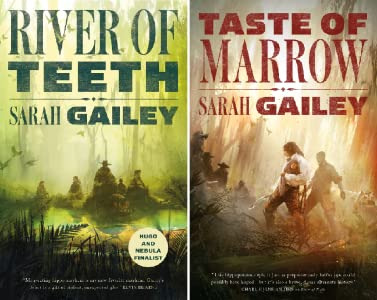
I’ve talked about River of Teeth before, but I finally finished the American Hippo duology and need to sing its praise. This is an alternate history series composed of two novellas that explore the question What would have happened if the States had decided to import hippos as livestock...? Anyways, my pitch for you: queer hippo cowboys. That’s all it took for me to read it. You have a gay gunslinger who loves his hippo to death, a nonbinary explosives-expert / poisoner who is the main love interest, a fat con artist who spoils her hippo and is the only voice of reason in this entire series, and a latina mother-to-be who is the scariest assassin in the entire series and is obviously scheming. The four of them are brought together on a job to deal with the Mississippi’s feral hippo problem.
IT’S A QUEER HIPPO COWBOY HEIST NOVEL GUYS I DON’T KNOW WHY I’M STILL TALKING AND YOU HAVEN’T JUST GONE TO READ THIS YET.
Petals to the Metal (The Adventure Zone series)
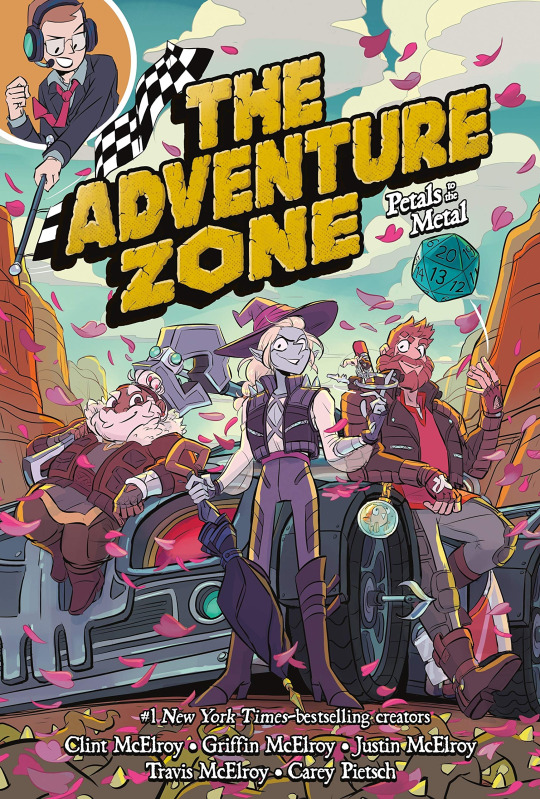
The graphic novel adaptation to the McElroy family’s DND podcast The Adventure Zone. Most of you are probably aware of this? It’s a great adaptation, it hits all the important beats, shows off the characters really well, and still gets lots of good gags in even while condensing entire arcs into single book stories. This one is probably my favourite so far just because Petals to the Metal was one of my favourite arcs in the show... but you can also see how the art has improved and the chaos of the race is fun to see drawn out.
If you like The Adventure Zone but haven’t tried the graphic novels yet -- would recommend! If you’ve always wanted to listen to The Adventure Zone but don’t have time for such a long series or struggle to focus on podcasts then pick up the first book of this series (Here There Be Gerblins) and try reading it! It really is an enjoyable adaptation.
Pony to the Rescue (Pony Pals series)
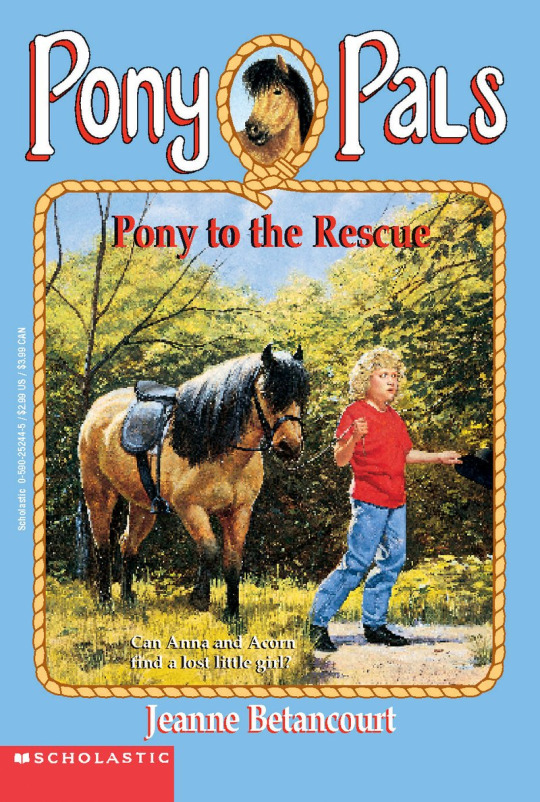
I continued my April/May theme of reading old-school chapter book series to combat Covid Brain Fry, so I picked up a few Pony Pals books. I read these as a kid and always enjoy them -- there’s just something so appealing to a child about having a horse. It gives your child characters a level of independence and ability to explore that you wouldn’t get otherwise. These books definitely read young, but they were nostalgic to revisit.
Small Spaces
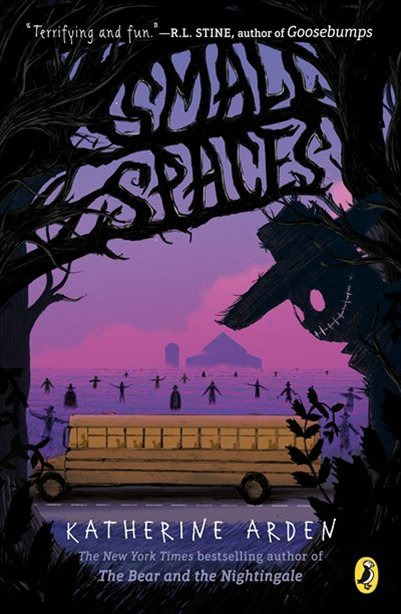
A really cool middle grade horror novel I picked up. Maybe it’s because I live around a lot of corn fields, but farm/scarecrow themed horror absolutely does it for me. One evening, after seeing a woman try to destroy a strange, old book, eleven year old Ollie doesn’t stop to think, instead stealing the book and running. That’s how she becomes wrapped up in the strange, sinister story of a cursed family and creature called the Smiling Man that seems to live out in the foggy fields. While unsettling, Ollie tries to remind herself that it’s just a story... but this becomes more challenging when her school bus breaks down one day out their own set of fields, and a fog is rolling in...
“Avoid large spaces. Stick to small.”
Snot Girl #1 - #2
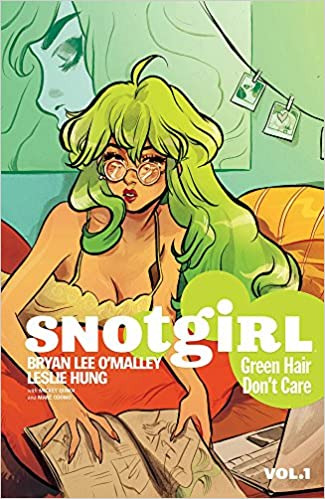
A Canadian graphic novel series by the creator of the Scott Pilgrim series! I love his work so I decided to give Snotgirl a try, even though it’s not generally my genre. I’m glad I did! First book took a while for me to get into, but by the time I hit the second I was really wrapped up in the mystery and character development. Snotgirl is about Lottie, a self-consumed fashion blogger whose biggest struggles are dealing with her allergies, frustration with her fellow-blogger friends, and how entirely her self-esteem is tied to her “beauty” and how people view her. But everything shifts in strange and horrifying ways when Lottie starts taking a new allergy medication, meets a new friend... and then witnesses that girl’s death. Or does she?
Seriously, or does she? I have no idea, I need to read the third book. This book is full of intrigue, complicated relationships, murder (or not?), and a healthy dose of magical realism to keep you guessing. If you like slice-of-life, crime, and abstract reality then this series is world a try. Plus the art is gorgeous.
Summer Wars #1 - #2
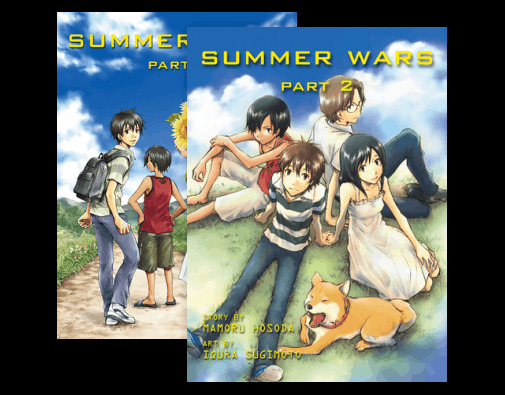
I recently rewatched Summer Wars (still one of my favourite movies) and decided to read the two-book manga adaptation. It was a really neat little adaptation. The creator of the movie gave the writer free range to tweak things to fit better in a manga format, which means some movie elements were allowed to fade into the background, whereas other aspects were fulled into the forefront and fleshed out to a greater degree. It was very cool, it kept the same story but gave you new things to think about which I wasn’t expecting. Reading this as a stand alone works just fine, but honestly if you’ve never watched the movie Summer Wars you should give it a try! It’s a great mix of slice-of-life, sprawling family dynamics that I relate to a little too well, cyber adventures, and fantasy. Super feel good.
This One Summer
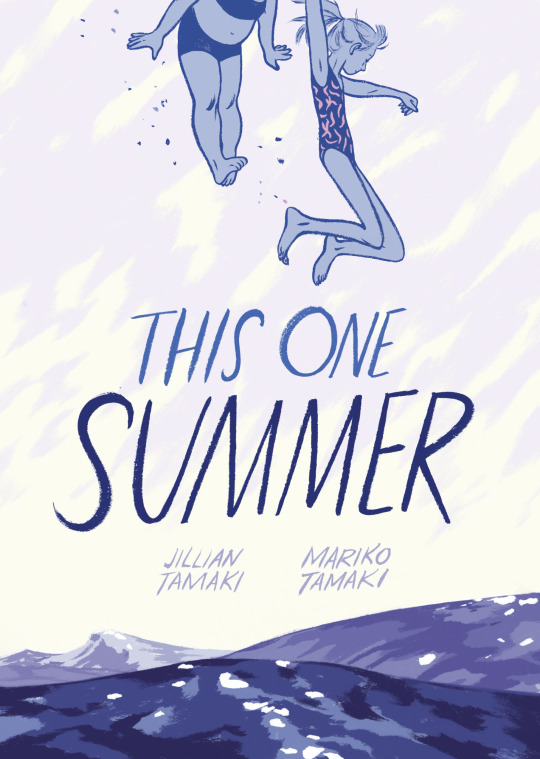
Okay, last graphic novel, I swear. This One Summer was... weird and intense. It’s a coming-of-age Canadian graphic novel that follows a pair of pre-teens who meet up like they do every year at their family’s summer cottages. You see them both in the awkward phases between childhood and growing up to become teenagers, as they’re confronted with things like maturity, friendship, self-esteem, family problems, and sexuality. A beautiful read, but probably the heaviest out of all the books on my list.
Wild Thornberrys Novelization
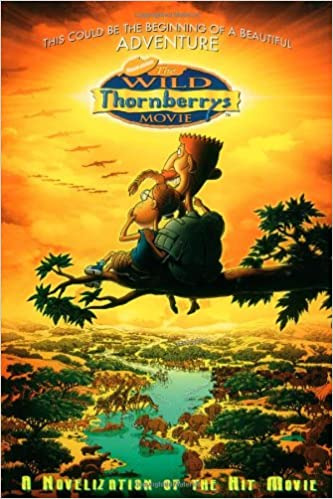
I rewatched The Wild Thornberrys movie with my girlfriend earlier this year, and decided I wanted to hunt down the chapter book novelization because I’m kind of a sucker for novelizations. Honestly, this was about what you would expect from the era. 90s/00s novelizations, especially young novelizations, are generally just a transcript of the movie without much thought or effort put into them to make them anything but. That’s what this was. It was fine, and it really let me revisualize the entire movie, but honestly you’re probably better off just rewatching the movie unless you also really deeply love The Wild Thornberrys.
The Willoughbys
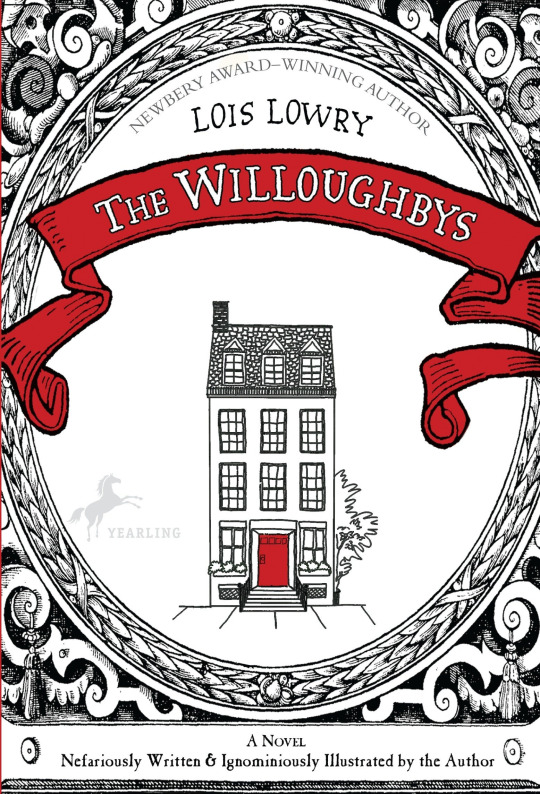
I saw that Netflix had done a funky looking adaptation of The Willoughbys and I decided I needed to read the book first before watching the movie. This was a little bizarre, I’m still not sure how I feel about it. Over all, I think it was a net-positive experience. It’s an obvious satire on classic children’s novels, especially the likes of Mary Poppins (real Mary Poppins, not the Disney version) and while a little heavy-handed, it does a Series of Unfortunate Events vibe that redeems it. The story is about a group of horrible children (The Ruthless Willoughbys) who decide they are sick of their parents and would rather become Worth Orphans... and to do that, they’re going to have to dispose of their inconvenient parents, obviously. Conveniently their parents are also sick of having children and decide to do away with them as well. The Willoughbys sets up three (or four?) different subplots that are gradually woven together through a series of schemes and exploits. It’s definitely more ruthless (hurr hurr) than the Netflix version, which tried to make the children more sympathetic, and in some ways I think that’s a definite point in the novel’s favour. I’m not sure I would go out of my way to recommend it, but it was a fun romp if you want something short and off the wall (and a lot more fleshed out than the Netflix version).
#book review#book reviews#the willoughbys#the wild thornberrys#lupin iii#scott pilgrim#snotgirl#bryan lee o'malley#this one summer#small spaces#pony pals#crave#the last firehawk#river of teeth#taste of marrow#american hippo#summer wars#petals to the metal#taz#novels#manga#graphic novels#children literature#kid lit#chatter
50 notes
·
View notes
Text
Idle Thoughts On Games During Pandemic Times
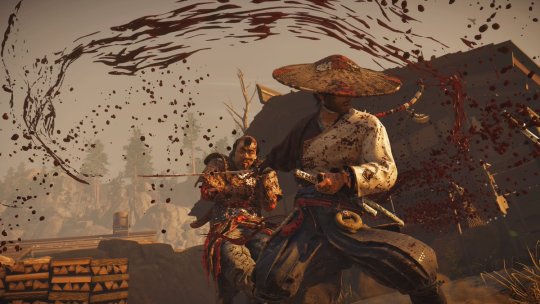
I’m in an interesting position as I write this. Since I’ve written here I have moved out of journalism and towards the dev side of games. Good news! I’m happier! Bad news! It can feel weird to have public opinions. That said, I miss writing and I’ve had some thoughts about games I’ve played (mostly major titles) that I want to share. I’m keeping them loose and I hope folks will allow me the indulgence. Here we are!
Ghost of Tsushima
I’ve been surprised by how playable Ghost of Tsushima is. Which is to say that the world is very enjoyable to explore. There’s something about ambling between marker to marker, or stumbling upon a few hidden items, that fundamentally works. I’ve seen some folks imply that this is simply the result of overproduced open-world design philosophies. A sort of focus-tested gaming drug-world that it’s easy to slide into. There’s probably some truth to that, and there’s a discussion to be had about the dangers of pastoralism, but I think that the open-world itself is designed well. Sure, there’s collectables and outposts to conquer and all the things you would expect but those are not the appeal. In fact, in many cases, engaging with those things feels worse than wandering. In the early game particularly, combat is not enjoyable. But there’s a sensibility to the world, a sort of stubborn antiquatedness that calls back to an open-world structure—one where space existed for its own sake—that we don’t see in as many games now. That’s curious to me because Tsushima has been criticized for feeling old-fashioned but I think this approach to world design isn’t so far removed from Breath of the Wild. It is certain littered with more *stuff* that you can stumble on but despite the fact that I can set markers or unlock bonuses that make these things easier to find, I don’t feel an overwhelming push to engage with them.
That good because combat is a decidedly mixed affair. I’m not eager to slide into difficulty discussions but if Tsushima’s closest cousin is Assassin’s Creed, it’s no surprise that I’ve instantly found the game more playable at a lower difficulty setting. If the goal is to emulate film—and there can be discussion about how well that’s actually done; black and white filters don’t suffice to make something comparable to Kurosawa—then Tsushima’s normally cluttered and gamey combat rubs against that impulse. It’s a game with sub-weapons, ninja-like tools, multiple stances for breaking the guards of certain enemies, and a wealth of skill trees. The beauty of the action (which you can frame at the push of a button thanks to a respectable photo mode) can get lost in the shuffle. Lowering the difficulty has led to speedier and more dramatic encounters where a few sword strokes can slay a handful of men. It’s a curious thing, as I tend to play games on higher difficulties, but this is one of the few times where I felt it might have served a game better to streamline combat down to the most basic of interactions. Tsushima’s combat can get very busy and I did not enjoy tackling challenges or outpost conquest until I progressed to unlock more abilities while also lowering the difficulty. Even then, those are the moments I care for the least.
I feel unable to comment on critical discussions about Tsushima’s story and politics but as an observer to the input of Japanese-American writers and Japanese devs/players, one thing that’s struck me is how the broader gamer culture has reacted to the dialogue. There have been moments where gamers have minimized the voices of some critics with the exultations of certain Japanese writers, which eliminates valid concerns from people who have every right to look close at a game connected to their heritage. The lens through which Tsushima was made was at the end of the day a Western one and that’s worth discussing. I am grateful for the writing of critics like Kazuma Hashimoto at Polygon that dig into these tensions. I will say that I feel like Tsushima sometimes wants to do the proper thematic thing where it will say that entrenched nobility and cultural notions of honor can be inherently damaging but because that’s mostly expressed, at least in the main plot, as “the outside invaders are besting us because of our traditions” it falls flat. Tsushima works best in side quests where the stakes are smaller. It’s thematic aspirations are best when things are personal and on a more humble scale. I like the version of Tsushima I get to play in those moments more than I like the grand gestures towards honor or combat challenges. Which is to say I mostly want Way of the Samurai with multiple zones and a more connective tissue. Tsushima teases that possibility without ever really getting there. In those teasing moment, the game makes a lot more sense to me.
I’ve enjoyed myself and intend to finish soon. That enjoyment comes with a lingering question: what other game could this have been? It’s inspired an image in my mind of a different sort of open-world ronin game where there is a smatter of villages with sub-stories and perhaps the smallest A-plot. A game with Mongol invaders, dramatic family conflict, or shogunate decrees. Tsushima has capture my attention but I do wonder more about what might have been that what is right in front of my eyes.
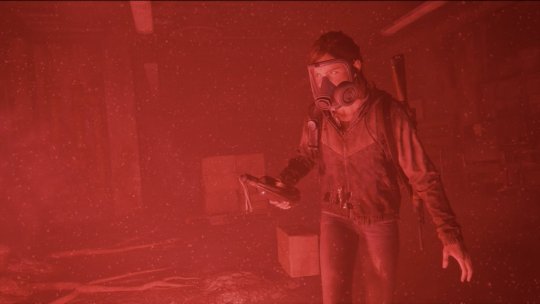
The Last of Us: Part II
I have struggled with this game in ways I did not know were possible. When I play it, I find myself taken in by the raw skill of the actors. There’s a mood and tone I enjoy, a somber twinge to the infected escapades that lingers from the first game. I like The Last of Us. I think there’s small moments of character interaction that express core things about the cast’s shifting relationships. James Howell embarked on a video essay series about this very thing and while it will remain unfinished perhaps forever, I suggest engaging with it. Suffice it to say, the changing language of Joel and Ellie’s mechanical interactions does a lot to underscore the narrative. I think players often think of the The Last of Us in terms of pure narrative but these smaller considerations reveal a game with a very natural approach to story telling. The Last of Us 2 has these moments and often hides them within combat. When multiple factions of humans and infected interact, their clash and the behavior of the AI tells something fundamental about the game world.
The Last of Us: Part II is a cynical game with an unflattering view of humanity, a view that (in spite of Joel’s selfishness in the first game’s climax) feels somewhat at odds with what came before. It is, in fact, possibly the most cynical game I’ve ever played. That’s hard to talk about but it’s best expressed in the various dying barks of enemies or moments where the player is forced into violent, dehumanizing slaughter. In the former case, it feels like a magic trick. The first time you hear someone cry out their dog’s name, it can be tragic. The next five times you hear it, it feels forced. Like any trick, it’s never as powerful as the first time. You might argue that’s the point: that as you follow Ellie’s journey, the player also stripes enemies of their humanity and agency but the player’s culpability is secondary to the writer’s in some ways.
Players did not contrive to have Ellie rob Nora, one of the game’s major black characters, of her fundamental dignity before murdering her. Nor are players the ones who shove a knife into Mel’s pregnant stomach. Those are scenarios crafted by designers and writers, and much like how retroactively guilting the player for killing a doctor in the first game (An unavoidable action, mind you! Joel will do this regardless of what the player wants.) feels manipulative, calling a player’s culpability into question as Ellie fails to act like any sort of reasonable human being also rings hollow. There is a perpetual push and pull between players and controllable actors, best expressed in the verbs that we are allowed to perform. It is telling the more often than not, Ellie’s most egregious acts of violence happen outside of the player’s control.
And yet there are moments where I buy deeply into the story. Notably, it happens when Abby is on screen more than Ellie. (Tangent: Abby has more interesting gameplay scenarios that lean closer to horror game vibes like what you’d find in The Evil Within. TLOU is way more interesting working in that mode than HUMAN vs. HUMAN drama.) Abby is also allowed more growth and agency than the script ever gives Ellie. At the core of this is Abby’s relationship with Lev. It is here that I’ve had my largest struggle with the game.
Discussion about Lev has often bowled over transgender commentators. For many people, Lev resonates regardless of anything the plot says about his gender. Lev captures people’s attention because Lev is eminently likable. That’s a testament to Naughty Dog’s writing. Still, there is a sense that Lev’s wider resonance has left some folks (particularly queer folks) without as much space to talk among themselves and hash out sentiments without the discussion getting overpowered. This is complicated by an environment where creators seem more empowered to directly speak to criticisms.
Which is to say that as a trans critic (perhaps ex-critic) watching from the sidelines, I was very hurt and dismayed to watch people who do not share in the transgender experience comment quickly about Lev. And while the discussions about Lev are varied—the trans community, like any community, is not a monolith—it’s sometimes felt like trans voices were made the quietest when talking about this character.
Many things are true about art at the same time. Lev can act, as is the case for some players, as a token figure whose struggles are appropriated and turned into spice adding flavor to the apocalypse. Spice that allows us to be seen as we are usually seen: in pain and defined by that pain, and which displays that pain voyueristically for cis players. Lev can also be a kind-hearted and respectable hero, and ray of light within a dark story. Neither feeling is in competition. Some will find strength and inspiration in the character, others will see the machinations of corporate powers and award-chasing writers. Both can be true.
Enthusiastic fans and players are quick—not in a malicious sense; merely in their excitement—to defend the things they enjoy. If they found a thing good it stands to reason the thing must be good. They empathized and that is taken as proof that a thing is good irrespective of other concerns. This is a kind impulse but one that robs people of their concerns, or at the very least close off conversations quickly. I cannot properly diagnose this except to suggest that there’s a growing force of cultural positivism that’s encircled games of a certain scale. One which shuts down a lot of valuable engagement. The bigness of the moment, of the object, demands the moment be the Best Possible Moment For Games regardless of the qualities of the object itself. That’s worrisome to me.
The Last of Us: Part II has become nearly impossible to talk about even now because we are dealing with an object so large as to have a gravity that weighs everything down. A game with sublime moments that intoxicate deeply but one where voices of critique or caution are buried away largely because of the potency of that intoxication. I deeply wish that wasn’t the case because the breadth of discussions that might’ve happened would have been really valuable.
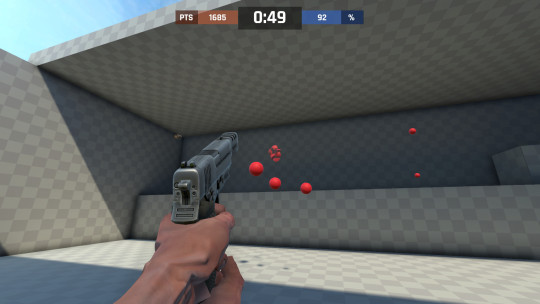
Aim Lab
I’ve gotten really into Valorant. It’s scratched an itch for a type of multiplayer shooter that I haven’t had scratched in a long time. My experience with the game itself has been good but the surrounding experience has been decidedly mixed. Suffice it to say I’m mostly living the solo-queue life and it’s a miserable existence even with the occasional highs. Yet, there’s a mechanical crunchiness to Valorant that deeply compels me and I’ve enough competitive drive that (in spite of the fact that the most of beloved social aspects of the game seem generally out of reach for me) I’ve really devoted myself to improving as player. Enter Aim Lab. It’s a totally free aim trainer that anyone can download off Steam. It has a variety of drills and exercises that can be used to improve a variety of first-person shooter skills. In one case, you might be flicking from target to target with the express goal of training your aiming speed. In another you might need to look at a group of colored balls, which will then disappear with one of them changed. You’ll then need to shoot at the different one as quickly as possible. You earn a score for each drill, which is tracked and compared to global records and folded into a ranking system. I’ve placed in the “Ruby” range for my rank, which is mostly in the middle of the road. (It’s a weird rank above gold but I think before Plat?) Mechanically sound with sloppy spots. I’m able to identify these thanks to Aim Labs. For instance, I know that I am fast and relatively accurate but that tracking moving targets is a difficulty for me. I know that I am quicker at things on the right side of my screen but also that I’m thankfully able to read changes in the environment quickly. This might sounds like a dry and rote way to approach video games but Aim Labs’ suite of repeatable and trackable challenges means that it is very easy to trace gradual improvements.
As a result, what might have been dull work becomes something akin to going to the gym. I can feel the ways in which my control over a mouse have changed. I understand which muscles need more flexing. Importantly, for all my weakness I also know strengths. Playing Aim Labs—and yes, this is play—becomes a semi-automatic and meditative experience like swinging at a batting cage.
As a player (again, I hesitate to use the word critic anymore) who tends to engage with games on thematic levels even when it comes to mechanics, it’s been surprisingly gratifying. Part personal ritual, part labor. Bubblegum for the brain. Chew chew chew. Shoot shoot shoot. Take some notes and chew some more. Not much more to say except Aim Labs has surprised me with how enjoyable and relaxing it can be.
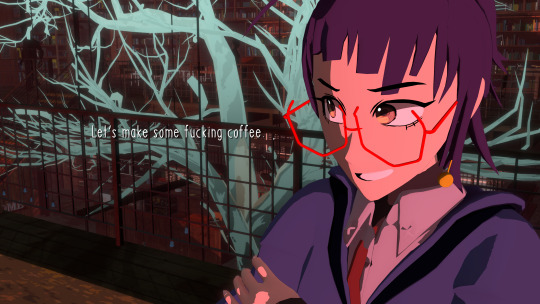
Necrobarista
Necrobarista was not what I expected. That’s because I started playing it with what felt like a safe-assumption: it would be comparable to some of my favorite indie “drink” games like Va-11 Hall-A or Coffee Talk. It’s hard for me to break down those games and how their structure—insightful conversations punctuated by drink-mixing and the occasional memory puzzle or story choice—works for me. I know folks who have played those games and bounced off for entirely understandable reasons but I love them. They call to mind some of the personal experience I had as both someone who worked at a bar and coffee shop. In spite of their fantasy settings, they evoke a highly specific and idiosyncratic part of my brain. Necrobarista doesn’t quite do that because it is strictly a visual novel. Repetitive work such as drink making is entirely absence. As a result, I initially found Necrobarista harder to engage with. It lacked the percussive but comfortable rhythm I was craving in quarantine.
That highly specific preferential quirk/personal need might place the game lower on my list then the other two (the game’s certainly in conversation with them to a degree; it’s got plenty of shout-outs and references that make it clear the designers know the ballpark they’re playing in) but it doesn’t mean it is a “lesser” game in terms of the world it is presenting or the character you’re watching. Necrobarista has, if nothing else, some of the most naturally flowing dialog I’ve experienced in a while. That is partly because I’ve been sampling so much AAA stuff, where the writing tends to eschew the evocative for clean, crisp (and corporate!) staccato, but even in comparison to other VNs or drink games, it finds some more integrated and interesting ways to handle lore dumps. That’s helped by the core conceit. The lead character Maddy Xiāo runs a coffee shop alongside her wise former boss Chay that just so happens to serve drinks to the recent deceased. That makes it really easy to introduce a character, as the plot soon does, fresh off the mortal coil and eager to learn about life after death. It’s a common writer’s trick to place a clueless character in a plot so world-building can happen but because the stakes are high—the freshly-deceased have only 24 hours before they pass into the afterlife—there’s an urgency in the explanations that feels warranted. I could probably spend a lot of time breaking down the ways in which Necrobarista successful builds the world around the player. From a well-framed scenario and properly placed characters (an inquisitive child-genius, for instance) to the ability to click highlighted words for snarky but never crass footnotes, you never want for necessary knowledge but also never feel like your hand is being held. You’re not digging for meaning or piecing together arcane lore concepts. You know what you need to know, it feels fun to learn it, and the characters all make sense. They’re also incredibly likable. Necrobarista’s largest strength isn’t that the details are handled well; it’s that the core cast is deeply relatable. That’s important because the story moves from coffee to magic and death within a clipped 4 hour playtime. Relationships are clear, motivations clearer, and while some of the standout story-telling pieces are in optionally readable side-chapters, the main story lifted up by how eminently fun it is to eavesdrop of these character’s lives. The only glaring exception is a Greek chorus of robots that seem out of place and overly-chatty. Necrobarista sometimes feels eager to impress structurally, and that’s no more clearer than when these fellas are on screen. The difficult thing about Necrobarista’s literary approach is that the pandemic’s completely shot my attention span. It took my two weeks of on and off play to finish what is a very short game. That said, given the enormity of some world events I found it edifying and cathartic to engage with a piece of media explicitly concerned with death and dying. It wasn’t what I thought and I kinda wish it had a bit more happening mechanically but I’m really happy for the time I spent with this one.
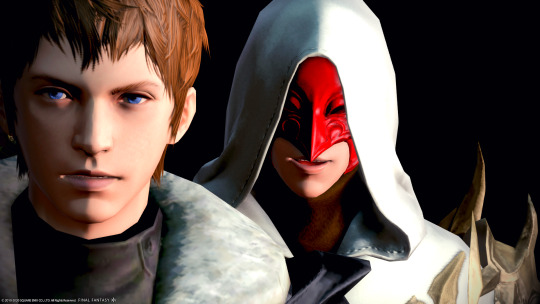
Final Fantasy XIV: Shadowbringers
Shadowbringers and Final Fantasy XIV in general is a difficult thing talk about. Not because of the accumulated history of a long-running game and storyline but because my feelings are ultimately swayed by a host of personal and specific emotions. I am a social player on a social server. I’ve spent just as much time coming up with roleplaying plotline and casually taking in taverns as I have tackling difficult bosses. I have made dear friends through FFXIV and even more than that. Those relationships, their energy and gravity, mixed into everything like an errand paint drop. You can hardly see it in the mixture but it’s unavoidably there. For many, this is a game of heroes and anime plots. For me, it has been a doorway to some of the most fruitful, edifying, and occasional painful experiences of my life. I say this because I want it understood that in spite of this sentiment, Final Fantasy XIV is a good game and Shadowbringers is easily one of the most confident pieces of video-game storytelling that I’ve ever experienced. Which isn’t to say it’s not sometimes trite or predictable. It’s not to suggest there is something groundbreaking here. For all of the craftsmanship, Shadowbringers often succeeds by embracing the conventional. It sticks to more well-worn plot structures, it simplified job gameplay and streamlined a variety of features whose strange and un-sanded bumps brought charm to the game. Yet, in the streamlining comes something more refined. Like running a soup through a fine mesh sieve to create something creamier and more rich. When you look at Shadowbringers high level plot: travel to the corners of the world to fight monsters, all while unraveling cosmic secrets.. it’s familiar. Even as the patches following the launch experience did, as all FFXIV patches do, focus on the fallout of the main story’s event, it kept to a strict content release pattern. If you’re digging for a revolutionary experience, Shadowbringers cannot offer it by virtue of structure. But what has been releases is foundational. The writing is of such quality and battle scenarios increasingly playful that everyone should be taking notes. A core component of Shadowbringers success is how deeply the story is concerned with genuinely exploring the richness of the scenario. It would be easy to craft a story about evil mages destroying the world. FFXIV’s done the more straightforward version of that at launch and it proved stiff. Instead, Shadowbringers’ has a deep concern with motivations and takes unprecedented time to explore the interior of the cast. This allows old characters to grow into bright new versions of themselves, and it has (two for two now!) turned villains into more than just monsters. The writing exhibits a delicious empathy for the world, and it takes time to give everyone a perspective. In MMOs, this is not always afforded. Characters act as quest-barkers and clumsy plot chess pieces. Shadowbringers strength rests in avoiding this in favor of clear stakes both personal and cosmic. There’s plenty to be said for other aspects. Masayoshi Soken’s music remains an incredibly powerful trump card, and the latest patch (which concludes the Shadowbringers story and sets up for next expansion) shows an increased willingness to employ fight mechanics that trick and test players in new ways. The content is challenging and full of tiny subversive moments that actually rob players of power they’ve taken for granted over the course of hundreds of hours. In finding its stride, Final Fantasy XIV doesn’t just craft sweeping narrative moments, it better integrates those stakes into individual boss encounters. There’s a cohesiveness, an interlocking of parts where each piece (music, narrative, gameplay, et all) are in clear conversation with the other and often in conversation with not only other expansions but other games within the franchise.
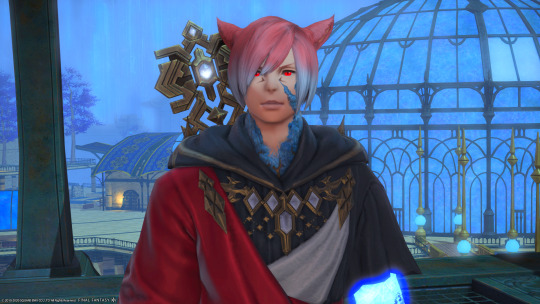
Recently, a piece dropped on Polygon with the title “Games need to return to black-and-white morality.” It was, if I can be honest, a poor title for the article and one which left a freelancer unduly exposed to harsh feedback. But there is a core kernel to the article. To quote the writer: “Watching our heroes stick to their convictions, even against insurmountable odds, ratchets up drama, rather than destroying it. The concept that good can ultimately triumph over evil is a timeless one, and stories that rally around this trope — around unadulterated hope — can help guide us through the year’s ceaseless onslaught of calamities.“ Shadowbringers’s conclusion brought this piece of writing to mind. I’m ironing pretty much all of that piece’s argumentation but the notion that games about heroes have great efficacy in times of uncertainty shouldn’t be a controversial one. The crux of my favorite game, Skies of Arcadia, is that heroism is hardly a choice at all. It is a compulsion, it is a duty that we all must accept when the moment comes. Shadowbringers is not quite as simple but it is ultimately a story about hero defeating the baddies, and I would be lying deeply to say that there wasn’t something incredibly, nearly word-defyingly beautiful about the feeling of hope I felt in its concluding moments. The sweeping power of epic fantasy and heroism holds true and, like a genuine panacea, held a curative power for my soul that was not just enjoyable once consumed but frankly necessary for my well-being. I’ve no clean conclusion here (and I don’t have to! ha!) other than to say that Shadowbringers has consistently proven a delight in a sea of rocky games media. It is affirming, exciting, and empathetic in ways that I was not expecting. That, along with the friendships I’ve made while playing, have secured its place as one of my favorite video game experiences ever. From start to finish, it really was a delight.
------------------ And that’s that! I was gonna write about Blaseball but I need to let my Blaseball feelings settle before even trying that. Anyway, if you read this.. uh thanks!
#FFXIV#Final Fantasy XIV#Shadowbringers#The Last of Us Part II#Necrobarista#Ghost of Tsushima#aim lab
16 notes
·
View notes
Note
Oh my gosh your ‘the name is English’ fanfic is so good. Any advice on getting like. The distinct voices of each of the characters? I’m just dabbling in homestuck fiction and I think I got Dave and rose and jade. But John and the alpha kids are hard
(Edited: I kept thinking about the mistakes I made in this explanation so I’ve finally gone back and fixed them pfffft, Also like... I think I might’ve misconstrued the kind of answer anon was going for, in which case, only the very end end of this long ass response is useful. Welp.)
SO FIRST OFF, I am insanely flattered anyone is asking my advice on how to write Homestuck characters because these are some of the most difficult characters I’ve ever written. Thank you so much! These kids each have an insane amount of dimension to them and I completely understand why they come off a bit intimidating to write correctly. I don’t even think I do that good of a job, lmao. Anywho, I’mma go ahead and apologize in advance because I got a little carried away with my advice. When I get to explaining things I like to over-explain and hope you just pick out what ends up bein actually useful to you. There is... a lot of shit under this cut, so be warned.
Hello! Welcome to this wordy as fuck space under the cut. (Edit: It won’t format correctly so ALL this bullshit under the cut. Thanks tumblr. SMD plz). Unfortunately I can't describe the way they talk without deconstructing a little bit on how I view each of their personalities because a part of me insists it's better to provide context and examples, so again, I'm sorry for these unnecessarily long ramblings. Skip to about the center of each paragraph if you want to focus on speech pattern-specific things, eheheheh.
John's pretty difficult for me too because his vernacular slate isn't as colorful as everyone else's, but this is kind of what I've come to understand about him: His general reaction to everything is a mixture of chipper and blasé--going with the flow. He kind of became the “straight man” in HS to combat the way everyone else was reacting to the wild shit that eventually went down. At face value, the way he talks makes him come off as a simple dude -- what you see is what you get, which isn't necessarily true. He's honest about his feelings but at the same time it seems like he has difficulty processing and understanding them, which makes them come through much milder than what you'd expect for the situation. It's probably why he absorbed his dad's death very slowly and got hit hard when it finally processed that he was gone for good. But not many things get all the way through his initial blaséness which actually makes him kind of callous in that he can give oddly indifferent responses to things others would consider a big deal, such as when Terezi died in front of him. He looked at her corpse and was just like "Eugh. She's so weird." Like damn dude, that’s cold. Ain’t like she bled to death or nothing. Anyway, some speech pattern specific things I keep in mind when I write him: He doesn't use a lot of big words, sticking to casual, simple responses, most of them positive or enthusiastic sounding. He sometimes uses old man speech and idioms, like Jake but toned down by like 85%. He's a bit slow on the uptake, points out the obvious, and says things that he thinks are clever but he's either completely missing the mark or being lame in general, not to say he can't sometimes be particularly sassy/savage, especially when it comes to his immediate friends because he knows them and can see through their bullshit better than he can with other people he doesn't know that well. In the chat client, he likes to divide combined words like "what ever" and "time line". If you're being canon compliant, he adopted some chat quirks from Vriska after they dated, such as multiplying punctuations by 8 for emphasis!!!!!!!! (edit: Ignore this last part. I think I may be thinking of a dead john, lmao.)
Jane's also a little difficult but easier than John since speech-wise, she's more of a balance between him and Jake + if they were super skeptical about everything and cared about being smart. She's actually kind of a wild card to me, because sometimes she has probably some of the most realistic reactions to the more ridiculous things in HS, but has grown used to equally ludicrous happenings such as the assassination attempts on her life in her intro. She also tends to wear her heart on her sleeve, and has quite the temper. She tries to override her more emotional responses with good southern manners because she's polite, god dammit! When her short fuse isn't ignited, her bottomless passion fuels her cheerfulness as well as her fearlessness. She's also pretty inquisitive, about the world around her as well as towards her friends, asking them questions to understand what they may be dealing with better. She tries really hard to be reasonable about things but struggles with letting other things that may be in play ruffle her well-kept feathers. Speech pattern-wise, she vacillates between speaking like a normal teen and a grandma, to a way lesser extent than Jake. Initially, she tries to keep it prim and proper--sophisticated like a southern suburban housewife with an interesting hint of embellished self-narrative like she's the protagonist of a Noir comic (like here), but when real shit starts to go down, she gets quite a bit more casual (like when they're on their quest slabs here). That is to say, I wouldn't say her normal way of talking is something that doesn't come naturally to her because it totally does, but she loses most of the laciness because short and to the point is better, which is the case for any of the kids with more flavorful quirks. She tends to steamroll over other people when she gets passionate about a topic, but when that's not happening, she's actually super accommodating, to the point of viciously ignoring her own feelings so she can be a voice of reason. In the chat client, she uses toothy emojis like :B.
Roxy, on the other hand, comes pretty easily for me because she's really similar to one of my closest friends and speaks much the same way we do when we're chill. We're also from the south, where much of the youth talk like Roxy does, lmao. Roxy is probably the most accommodating of any of the kids, readily bending over backwards to cater to her friends' needs and letting her own needs take a backseat, which probably leads to a lot of resentment she keeps buried. But she's still the chillest one, taking just about everything in stride before and after her alcoholism. She tends to get sad before she ever gets angry. And if she does get angry, it's usually only frustration at others for being difficult. Communication-wise, she's the most shorthanded--thinking and living in chat-speak. She's all about living her best life and taking care of her family so things are fun and peaceful. She wants to be super sure of herself (like Dirk) because she wants to be reliable. When talking, she likes to use a bunch of metaphors (again, like Dirk), and she tends to casually throw in a lot of puns too, such as when she tells Jake that they're still "humanated" when he asks if he's alienated her too. The nature of her responses is typically pretty flippant, even when things are serious. It's probably obvious that getting comfortable with general Ebonics will help a lot when writing her. In chat client, I try to remember these things: typos only happen when she's drunk--when typing her drunk, I avoid actively trying to give her slurred speech. Instead, I kind of let my fingers type a little more haphazardly and leave the typos I made that sound like mistakes she would make. She only tries to correct a small portion of her typos, more frequently the closer she is to sobriety. When she IS sober, her shorthand isn't consistent. One sentence she'll write "u" and the next, she'll write "you". Same thing with "2" and "to" or "4" and "for", etc. She'll cut out unnecessary letters in words, use typical chat abbrevs, and only use singular letters in place of a whole word, like "y" for "yes". Also uses smileys and other signs like <3. She's super fun for me to write because she comes away with a general feeling of "lmao" if that makes any sense.
Jake I'm always worried I'm doing wrong but he seems to be the one people love my characterization of the most so far, lmao. So I guess I must be doing something right. The thing about Jake is he wants to be the "likeable character". He takes what people want in a guy and molds that into this garbled persona. So when he talks to others, even his friends, he tries to be super agreeable, positive and supportive, regardless of the subject matter; he’s always talking these people up to make them feel good about themselves so that they enjoy conversing with him. But the reality is that he's extremely (but not necessarily intentionally) self-centered. He also aggressively ignores anything negative or forcefully turns it into something positive even when it doesn't make sense. He only tends to express frustration when others (Dirk) are being difficult; I don't remember if he ever actually gets angry in the comic?? He also likes to express surprise/amazement at things (a lot more than the other kids do at least), at the beginning of his responses, even when someone says something that's particularly obvious. The thing that gets me about Jake is that his superficial shell is so impenetrable, I don't think that issue was ever really fully addressed, much less fixed in HS, which leaves a lot of questions about his character & several different but valid interpretations of him by the audience. He may very well actually just be an oblivious idiot who's suffered brain damage one too many times (there's not too many pieces of supporting evidence to negate this) but I personally like to think Jake is far more complicated than that. I mean, look at how many convos he's grabbed the helm of and steered into a completely different direction just so he doesn't have to deal with something. His speech is probably the one I have to look up references for the most because he uses a fuckton of idioms you'd only hear one’s well-meaning but probably unintentionally racist poppop use, and a weird mixture of western/country and british vocab + bro speech he probably adopted while talking to Dirk. This is one list I find super useful when trying to find words to use (bless this person), but I still have to google a bunch of goofy phrases and words to be sure I'm not exhausting my material. One thing I know I do wrong when it comes to Jake's speech is use modern British slang such as "bloody" and "bloke", which is something he absolutely never does but I use them anyways because... idfc, I guess, idk. lol, I acknowledge it so it's fine.
Dirk is probably the one that comes easiest to me because he and I behave and talk pretty similarly. Either that, or I just like to think that and I'm just projecting while writing him completely wrong, lmao. Either way, Dirk hides behind the fact that he's super chill and levelheaded when really he's a nervous paranoid wreck. He's always thinking and overthinking about everything and he never gives himself a god damn break. He calculates every response he gives so it comes off exactly the way he wants it to, so when it doesn't because he's caught off guard, you get to see these little snippets of this dude freaking out underneath. He's a neurotic control freak that makes sure the flow of conversation stays on a set course he wants it to or else he gets either uncomfortable or pissed off. He skirts around anything that might get personal to him and dismisses any focus that sheds light on his own emotions UNLESS he feels, again, that he can control that flow of conversation. Or he's already emotionally compromised. Either way, he avoids conditions that might catch him actually being vulnerable because he's just too fuckin' proud. He likes to make a lot of comparisons, using extended metaphors and milking the fuck out of them if he can get away with it because the more he talks, the more he feels in control. He likes to smoothly play along with people he finds are being ridiculous, like Jake and Caliborn, or even just because he knows they'll know he's just playing along like Roxy. That's a key thing for me actually--how much he likes to fuck with people and how inelegantly he takes it in those rare cases someone successfully fucks with him. His speech seems to be a balance between Rose and Dave, a chill bro with access to the biggest vocabulary ever. I encourage aiming towards sounding like a pretentious asshole when writing Dirk because that's what he is all the time sometimes. He likes to Dirk-splain because more often than not he knows exactly what he's talking about, but he also doesn't realize his Dirk-splaining is something no one needed or asked for. Even though he's acknowledged and now resents the ludicrous size of his own ego, he still struggles with not stroking it at every opportunity. He’s a super capable, reliable guy and he knows it, but the reality is that much of what he plans for doesn’t work out. It’s only when he and his friends are really in the shit and he doesn’t have time to think that instinct takes over and he ends up doing some hella amazing things (Unite: Synchronization). That’s why his whole thought process of being better off alone is dangerous--he’s capable because he has people he loves relying on him. (I went off on a tangent unrelated to speech here. I’m sorry. I got a lot of feelings about Dirk and his selfishness vs. his selflessness, lol)
With all that, these are some general notes I try to abide by:
The ramblers of the kids are Dirk, Dave, and Jake, the former two especially when they're anxious. Dave's definitely the worst in that regard. The Striders both act like they wanna come off as men of few words and both fail miserably; it seems like being forced to live in verbal silence for a good portion of their lives gave both of these social wrecks a stigma against any gaps in conversation. Jake on the other hand rambles because he's self-important, not unlike Dirk. It's almost like he's not sure how else to contribute to the conversation if it's not about movies or himself.
For me, it actually helps that I think Dirk and Jake may both be on the spectrum. (I'm sorry if the following offends anyone who is on the spectrum, but this is just my general experience talking to people with those conditions). It certainly explains why their joint communication is so shit and why they either both give long-winded explanations that no one really asks for, or extract themselves from conversations they don't have a good foothold in, the latter being way more common for Jake (I hint a little at all this in my fic, moreso for Jake via Dirk's observations). They both want to be heard but may have difficulty being good listeners because their heads are already filled to the brim with things that have been cycling since before the other person has started talking.
On a final note, I find it pretty important to note the changes in each character's demeanor and way of talking after certain things happen. A glaring example is the Alpha Kids' behaviors after the batshit candy juju episode they all had. When Jake's broken out of his glorified, overwhelmingly positive fake self-image, he's actually very self-critical. However, his self-centeredness is hard to break out of, so when he broods on all the flaws he'd ignored in favor of being the guy everyone likes, he directed all of his nervous energy into finding reassurance from Roxy. (This self-deprecation could've also been born from his constant need to be agreeable, so since he thought everyone considered him to be a piece of shit, he felt the need to agree that was the case. Depends on how you read it.) Roxy had a shorter fuse and was a bit more snappy and resistant to dealing with Jake's ridiculousness. Jane remained calm and acknowledged she can be a bit too stubborn and self-righteous. Dirk finally took a step back from the details and absorbed the big picture of his problematic expectations toward his friends and himself. It’s just something to keep in mind if you fear you’re getting kind of OOC with their personalities. It’s natural for people to behave different based on changes in their mood, so don’t be afraid to experiment.
All that being said (I lied about that final note), I go back and reference the comic a lot when I’m unsure whether I’m representing a character accurately. It’s a good habit to double-check yourself. If you’re unsure how you’re writing a response but wanna move on, write it the best you can and then come back to it later and revise after reading a few conversations that include that character.
Most importantly of all: the thesaurus is your fucking best friend of all time. Fuck everyone else. The thesaurus is your god damn hero. I find “define:”ing words on google actually super helpful when trying to find synonyms that work better for me.
But that’s it! I hope you found at least a few things helpful in that word splurge of fumbling analyses. And thanks a bunch for reading my fic! It’s not super popular so it’s reassuring to know there are people out there who really enjoy it. Keeps me trying to update regularly at the very least.
13 notes
·
View notes
Text
Apprentice April
I’m a little late but I’m going to do Apprentice April!
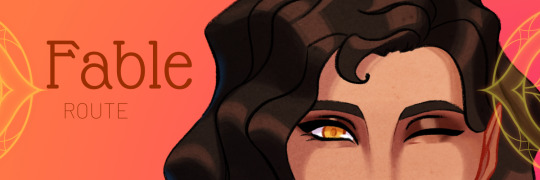
(sprite by Jilljoycearts )
(banner by me)
1. The Basics. What is your character’s name? How old are they? How tall are they? Skin color? Eye color? Hair color? Gender identification?
Captain Faunalyn Catrìona “Fable” Amastacia
Half-elf || Bard || Pirate
Age:25 (ish timelines are wild)
Skin: Olive
Eyes: amber gold
Hair: Cinnamon brown Wild curls
Height: 5”0
Gender: Cis woman (she/her)
Fable started her life as my very first d&d oc. I love her so dearly and she was way to perfect for Julian for me not to use her as my arcana mc. That being said her backstory is the same up to the point she started questing in our campaign. In the Arcanaverse it is after her failed mutiny she ends up in Vesuvia rather than adventuring with the party. I.e the arcanaverse is AU for her and I try to tag it so it’s less messy. How did she get there? Dimension door? The lord of portals? Me pretending the places from our homebrew d&d campaign exist in the Arcana Universe? Who knows! (I sure don’t)
2. Love Interest. Who does your character love? What attracted them to that particular LI?
Fable is a Julian girl through and through. They are both rowdy swashbucklers for a start. They are both very flirty and adventurous. She’s always been a sucker for the roguish sort and Julian was basically in love the first time he saw her. More than that, however, Fable is a bit of Gamophobia and has always felt like a temporary fixture in other people’s lives. Julian’s dedication to her, while sometimes overwhelming gives her some stability. Julian cares so deeply for others and Fable can be a little selfish. Fable is very assertive and quick to call Julian on his self-flagellation. Fable is fiercely independent and reminds him she’s his partner not a damsel in distress. For as much as they have in common, they also are opposites in a lot of ways and bring out the best in each other.
3. Familiar. Does your character have a familiar? How did they meet?
Fable has a fae songbird named Bonnie. She was a gift from Fable’s father when she was young.
4. Hobbies. What kinds of things does your character like to do for fun?
She’s a bard so music is the obvious one! She sings, plays herdy gerdy, lute, and pan flute. She loves to drink and party. She loves sailing and finds a lot of comfort in being on the water.
5. Hidden talents. Is there something neat that your character can do? Tie a cherry stem into a knot with their tongue? Say any word backward perfectly?
She can Knit really well
She can hold her breath longer than most people
6. Magical talents. Is there a specific type of magic that your character excels at? Any magic they aren’t so great at? Or do they actually shy away from magic altogether?
Strengths:
Bardic Magic
Nature Magic/Wood elf magic
Divination
Dimension Door Conjuration
Polymorphing & Illusion magic
She is VERY superstitious and she’s terrified of necromancy and the undead (Ironic for her Arcanaverse cannon)
7. Interaction. How does your character typically interact with people?
By charming the pants off them, sometimes literally! She’s quick to make allies and friends. She knows just how to butter someone up.
8. Romance. What is something that your character and their LI love to do together? How do they show affection?
Fable’s love languages are quality time, physical touch and gifts.
I HC Julian’s as quality time, physical touch and words of affirmation.
They love to sail together. The sea was such a fundamental part of both their lives. They go dancing at the Raven and get sloshed. They are almost always touching when they are together, holding hands, brushing against each other.
9. Travel. Does your character like to travel outside of Vesuvia? How often? For how long? What kinds of things do they do away from home?
Fable can not be suck in one place for too long. It makes her restless and she craves adventure and a change of scenery. I’d like to think she and Julian take piracy back up for a while post-game.
10. WTF. Has anything just…weird ever happened to your character? Something that made them stop and go “What just happened?!”
Find out she died from the plague was a pretty major one.
11. Crime. Has your character ever been arrested? If so, what did they do? Have they ever helped stop a crime?
Oh boy, yes she has. She was raised in a city run by pirates and thieves, known as the “city of freedom.” She definitely doesn’t respect authority and has been known to have a few too many.
12. Secrets. What is a secret that your character has? Are they in line for the throne in a far off land? Was there this one time at band camp…? Are they secretly involved in an assassin’s guild?
I would say she has secrets per say, just that she’s a bit evasive about her feelings and past.
“None of us really know Fable. Anyway… Fable is so weird. I’d love to meet her someday.”
On a darker note, I suppose the fact a lot of her bravado is performative and she’s got a lot of stuff she just doesn’t want to deal with.
13. Overcompensation. Is there something that your character just HAS to do better than anyone else? Or are they just that dang good without trying? If they see someone else showing off, what is their knee-jerk reaction?
She is an awful showoff and definitely feels like she has to prove herself to others for approval but she’d never admitted that.
14. Fight Club. Is your character a good fighter? What kind of skills do they have?
She is! Her fighting style is a mix between huntress and harly quinn! She’s not super strong but she’s fast and scrappy. She’s skilled with rapiers and crossbows.
15. The Arts. Is your character a creative type? What kinds of things can they create? Can they act? Street perform?
BBE (big bard energy). She’s always performing.
16. Goofy. Is your character a clown? Do they like to make people laugh?
She can be funny! She’s got a sharp but cheap wit.
17. Language. Is your character multilingual? How many languages do they speak? Do they have an accent? Is it sexy? Is it silly? Do they have a multilingual lisp?
She has a Scottish accent. She speaks common, Òran*, elvish, & orcish
Common is a given, she is, however, bearly literate in common. Her mother’s culture doesn’t have a written language and it’s not their mother tongue so they really only learn enough written common for trade and dealings with other people.
Òran*: it’s just Gaelic but for the human culture I made up for her mother’s side of the family in d&d. I will link the whole post about that here. It’s an oral-only language and Fable’s first language.
Elvish: She’s a half-elf and spent a lot of time with the elves when she was younger. As much as she hates being connected to the elves, it’s her strongest written language. She’s the knows wood-elf dialect best..
Orcish: Her long time on again off again ex-partner was a half-orc.
18. Embarrassment. What is something really embarrassing that your character has done/said?
Indecent exposure.
19. Memory. Has your character gotten any of their memory back? If so, what? Did it change them?
She has. It’s hard because she got a lot of good memories back but also a lot of trauma. I think she had started to lean into some of her bad habits at first but tries to work through them. She definitely went home to her mom with Julian. Their relationship is very important to her and she would want to see her as soon as she could!
20. Family. Talk about your character’s family. Who were they
I’m just going to link this here lmao.
5 notes
·
View notes
Text
Thoughts on ToG
OK, so @nickjgoodsell asked me why I don’t like this series anymore, and I promised I would write a post because how I feel about it is pretty complicated. I used to wholeheartedly love this series - I read Sarah’s blog religiously and even met her a couple of times (I think, I don’t remember, but it was at least once). However, some time after I read QoS, I stopped liking these books, for a multitude of reasons:
So basically, I thought that ToG was just OK. I liked Celaena well enough even though I didn’t think much of her assassin skills, but I liked the mystery parts. Nehemia and Dorian were my favourites, but I though Chaol was kind of dull, but I didn’t like Celaena with Dorian because it kind of felt like she was stringing him along and looked down on him throughout the first book and the second.
I thought CoM was way, way better - at first, which I’ll get into - because I thought the writing and plot was better, and the world was opening up. But I hated the way Chaol and Celaena treated Dorian, and I was devastated that Nehemia died because 1) Badass, magical, female character of colour that tricked all the other people into thinking she was an idiot while secretly spying on them and she’s the one who died? 2) Dorian/Nehemia would have been far superior to those other two. Imagine if they had killed King Haviliard and then just went around restoring magic and looking fine af.
But, whatever, I was intrigued enough to read the next too, and I loved HoF. Before I read that I read TAB, which I thought was a brilliant way to explore Celaena’s backstory. When I read QoS, I was still excited about it - or so I thought. When EoS came out, I read the first couple of pages and was inexplicably bored. Whatever. I thought maybe it was exam stress preventing me from concentrating. But then over the next few months it kept happening, until suddenly ToD was coming out and I still hadn’t finished it. Then KoA came out and I still hadn’t read it, so I decided to reread QoS again so that I could sail smoothly back into it. So I did. And then I realised that even though I thought I’d enjoyed QoS, rereading it made me realise that something in that book killed all my desire to read the next one. Which I will explain when I outline my reasons in detail:
1) Story
OK so remember when you read Prisoner of Azkaban, and Sirius turns out not to be a fink and the whole mystery surrounding the Potters’ deaths gets turned on its head and you realised that JK Rowling was a genius who put her all into her story? I originally thought that about Sarah, because you could see that she was thinking about her story from the very first story in TAB (obviously because she wrote this story when she was sixteen and then split it). From TAB to HOF, I could clearly see that she was building Celaena/Aelin into an epic hero/Chosen One, who had to go on this quest of discovery and accepting her past mistakes, before picking up allies and defeating the evil whatever it was. Right?
Except, when you get to QoS, it’s like the entire thing gets derailed. Arobynn Hamel, after being built up to me one of Celaena’s most complicated adversaries, is dispatched offscreen by a character that we’re not even introduced to in the main series (Lysandra). Instead of a clear goal and obstacles that derail them, the story is just a series of plans that Celaena/Aelin is keeping us in the dark about, so we don’t know until she’s won. The sense that we’re building to something is kind of lost, because we pick up new objectives every few chapters. What felt like an epic journey sort of tapered off into a bunch of scenes where everyone was up against it...until Celaena revealed that she’d been planning this all along.
Also, the retcons that apparently happened. Elena sent Aelin to Rowan for “happiness”. Maeve tricked Rowan into thinking Lyria being his mate because reasons. Elena and the gods have been manipulating everything because they had a spat a few hundred years ago.
I think that the reveal that Celaena was Aelin was planned from the beginning, but I think QoS was almost the start of a new series - and not just because of the name change. It’s like she just took the story in a completely different direction. I remember in an interview Sarah mentioned that she likes to see where the story takes her as opposed to planning, and even though I still haven’t read past EoS, what I’ve heard, the story ended up in a completely different place than where it was going.
2) Characters
Like I said, there was no one I hated - at first. In fact, by the time HoF was over, I was loving all the characters. I thought Sarah had rendered them so well that I couldn’t wait for all the different personalities to meet and all the banter that would ensue when they all realised they were working at cross purposes.
But then QoS happened.
Celaena, who underwent some incredible character development in HoF, turned into an absolutely horrible character in QoS. She was arrogant, violent, impatient, cruel, and selfish - with none of the redeeming qualities. She detested her old self even though that self got her where she is today. She treated her so-called allies like idiots or like downright enemies. She threatened to kill everyone who didn’t agree with her.
Rowan, who went from a misanthropic douche to loyal friend to Celaena, spent QoS completely obsessed with her and with growling at every man (sorry, male) who gets within spitting distance of her. I hear he got worse.
Chaol went from a well-meaning if not naive guy who loved his friends to an unrelenting douche who argued with Celaena for reasons, and then apparently disappeared.
I’m not even going to talk about what happened to Dorian and Manon.
And therein lies the reason I didn’t want to read EoS - because QoS had effectively made me hate all the characters. Not only that, but it starts with Celaena hanging out with Rowan, Aedion, Lysandra and Evangeline - four characters who were only introduced the book before, and who spent so long either basking in their own brilliance or being territorial over Celaena that they never got to form meaningful bonds with any of the characters that we did know before then. I couldn’t get through the first chapter because I literally couldn’t give a shit about a bunch of people I just met.
And then there’s the Chaolaena thing. I didn’t particularly care for them one way or another. I thought they were a well-written and well-matched couple, but I personally found Dorian way more interesting. And they were written like they were destined to be together. Even when they were talking about the fact that Celaena might not pick him when she became Aelin, there was none of the vicious antagonism in their relationship when they met again. OK, I expected her to be mad at Chaol for leaving Dorian, but to drag it out so long? And every other argument they had was artificially lengthened to justify them never getting back together so she was free to get with Rowan, where the two people from the last book would have worked it out like adults.
And this takes us right back to the retcon thing. I specifically remember an interview right before QoS came out where I noticed that Sarah was talking about Rowan a lot. So much so that he almost felt like a deuteragonist. When I read the book, I realised it was because she’d decided to torpedo Celaena/Chaol in favour of Rowan/Aelin - which I have no problem with. I just wish it had been done with more grace. Aelin and Rowan went from having a great platonic bond to suddenly wanting to rip each other’s clothes of whenever they saw each other. Aelin went from accepting that Chaol and her were over to wanting to kill him whenever she saw him. Rowan basically wanted to lick her whenever they shared a room, and turned into a giant baby when another guy got near her. The emphasis that their platonic bond was given was traded for them lusting after each other like horny teenagers.
3) Writing
Look, I’m just going to say it - QoS felt like fanfiction. There was just an abundance of similes and metaphors, and her writing got to be so overblown and dramatic that it was eyeroll-inducing to read. But that’s not even the worst of it.
I read ACOTAR when it came out. I liked it, but I really hate Fae/Faeries, so I wasn’t going to continue. Then when I read QoS I realised that all the guys in that and all the guys in ACOTAR are essentially the same character - territorial Fae males who constantly thought about the main female character, sex, or sex with the main female character. Aedion and Rowan were the same character in different colours. And all the girls were the same too - badass but vulnerable and always ready with a snarky comment. The similarities between the two were just too much.
Then there’s the actual structure of the book - like I said, it felt like fanfiction, and like a series of events strung together rather than a book. There wasn’t really any clear structure to speak of, which is why it felt so odd. There was no clear goal at the beginning, so there was no inciting incident, no first plot point etc. It felt like set up for the next book.
And finally, the style. HoF, QoS, and the little chapter of EoS are all completely different. One of the opening chapters has s Fae warrior (I forget which one and also I don’t care) trying to figure out whether a girl with big breasts is a virgin. I think it’s supposed it’s supposed to sound like high fantasy like GRRM, but it just sounds predatory and weird.
There’s actually way more that I now dislike about this series, but I’ve spent too much time on it. I’ll always love the first four (I include TAB) and parts of QoS (”Witchkiller is still the best thing ever), but I’ll never finish it.
40 notes
·
View notes
Text
henlo. have an expanded Shining Quest AU.
to release some steam from my kettle of stress, have some noodling about a Shining Quest AU that’s less April Fool’s, more high-stakes high-fantasy, but still every bit as tropey, stuffed with otome trappings, and Yay Music as we’ve come to expect from Utapri
As with the last venture into this AU: not explicitly romantic, non-gendered MC, SFW, and mild CW for arranged marriages. I don’t know HEAVENS (plus they didn’t get canon classes for Shining Quest), so we’ll just be covering STARISH and Quartet Night!
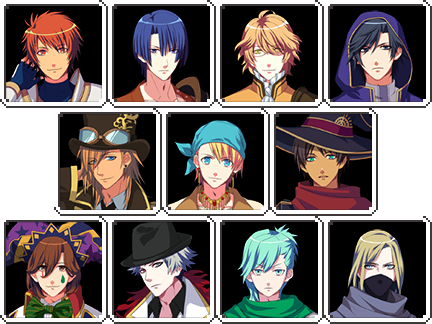
It’s a fairly typical setup -- there’s a fantasy kingdom, there’s a useless king, there’s a princess (Haruka) known for her talent for music composition, there’s a court of nobles and royals, all that usual hey. Magic is cast by mastery of the arts, whether that be visual, performing, musical, written, you name it.
There’s a looming threat of some sort of demon king or similar fantasy anime bullshit that the royals and nobles of the kingdom are tasked with keeping at bay. We’re also gonna shamelessly borrow a detail from the pinnacle of wasted potential, the movie Rock and Rule -- there’s a plot point about how a demon can only be forced back with “the magic of one voice, one heart, one song....but there is no one.” Here in this ‘verse, that’s a longstanding prophecy the status quo has taken to mean there’s no-one who’ll ever be able to defeat the demon king.
The solution that’s been in place for as long as anyone can remember is a royal or noble family offers one of their heirs as a sacrifice to be married off and sate the demon king for that generation-- the “devil’s bride” or “devil’s groom” or “devil’s betrothed.” This goes pretty badly for the heirs, of course, but it offers great prestige to the house that does it.
You, the player, would get to pick what RPG class you fill (which would affect some dialogue trees and the expertise you demonstrate) and what art you use to cast magic. You are a member of the royal guard tasked with Haruka’s protection, but you’ve stumbled into the knowledge before it goes public: she’s the next devil’s bride! You go to Tomochika, a hired hand to the royals who’s been dating Haru in secret, and you begin to hatch a plan to bust Haruka out of the arrangement.
Your route’s then determined by which of the boys you seek out as your other co-conspirator.

Otoya is a fellow member the Royal Guard on Haruka protection detail. He’s equally resented and well-liked for his dauntless optimism and natural talent with swordsmanship, but it’s no secret that he’s not someone you’ll be trusting for expert strategy. He’s had the chance to become friendly with Haruka, and he’s ready to fight tooth and nail for her freedom! He’s classed as a warrior, who casts light-element attacks and healing spells with his music.
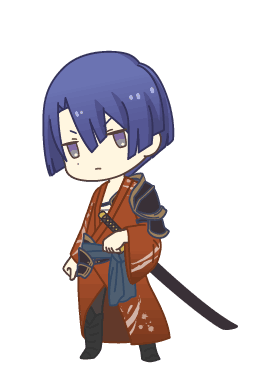
Masato was raised from birth to become an ideal Devil’s Groom, since the Hijirikawa nobles are falling out of favor in the courts (spurred in part from their takedown of the Kurosakis backfiring on them). But Masato has rejected that he (or Mai) will ever go along with that plan, instead intently training in swordsmanship and fusing music and fiber arts to make enchanted fabrics that work like armor. Quietly, he has kept a very ambitious goal in mind: outright defeat the demon king and end the legacy of the devil’s betrothed.
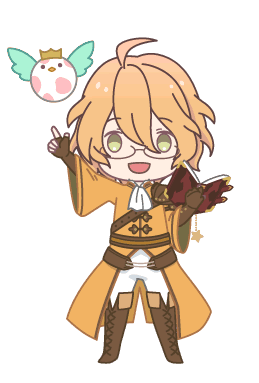
Natsuki is a natural genius at using both his voice and viola to communicate with creatures and summoning the cutest ones to absolutely wreck house. Though a humble farmboy who’s kind of out-of-touch with the political goings-on of his land, his talent was too great to go unnoticed forever, and he was invited to live among the high court as an entertainer and summoner. He got to make so many new friends (like the princess and you!) and better provide for his family, so he’s thankful every day for the change, even if he misses his animal friends at home!
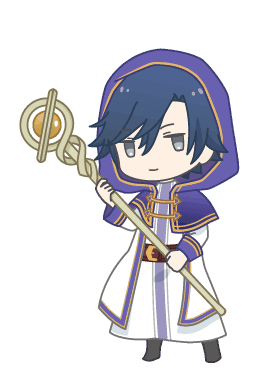
Tokiya came from a humble family that wanted to lead a quiet life, but Tokiya himself had ambitions that far outpace that. Though not a natural talent, he put unimaginable sweat into a field that creates potent spells and tools by the power of song. Eventually becoming estranged from his whole family, Tokiya finds it all worthwhile after struggling his way into being hired by the royals. Much of the court thinks of him as a weird mad scientist who sings to his books, but he’s found fast friends he’d go to the ends of the earth for, like Masato, the princess, and you!
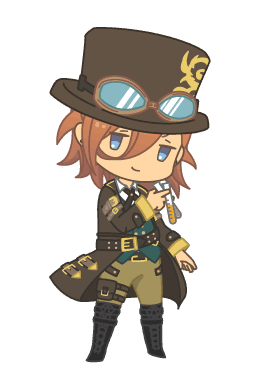
Ren is the inverse of Masato in his circumstance. Like the Hijirikawa noble family, the Jinguujis helped orchestrate the fall of the Kurosaki nobles, but the blowback had them falling out of favor instead of rising in power. Ren was planned to be offered as a Devil’s Groom to restore some clout, but instead of being intently groomed, he was left to do whatever he wanted since he’s got such a foregone future. So Ren becomes a carefree playboy, eventually taking his talent for alchemy and becoming a for-hire adventurer to sate his boredom. He tells everyone his saxophone is his secret to brewing his one-of-a-kind love potions, but he’s actually devised some uniquely remarkable revival and buffing potions.
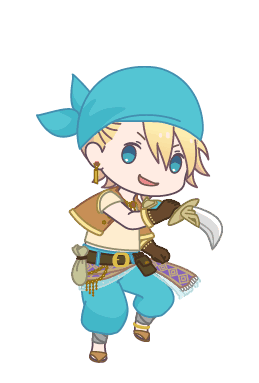
Syo comes from the same backwoods as Natsuki, but took less interest in working for the courts and instead trying to find a career emulating his childhood hero that kept his body’s limits in mind. But his twin left to pursue medical schooling, and eventually, between loneliness, worry, and the promise that the musical magic and medicine in the courts could help him safely push his limits, he follows Natsuki into the belly of the royals and nobles. His small stature and commitment to the movement arts made him a natural rogue, and he’s technically part of the Royal Guard’s special ops. But Syo’s brashness and burning spirit tends to best serve motivating the people around him -- what few spells he prefers to cast with his violin-playing are all buffs that lift the spirit and energize the body.
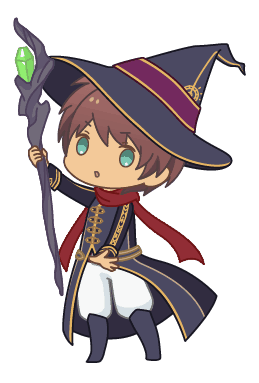
Cecil came to this land on essentially a study abroad program and came to love the friends he made so much he stuck around! A wildly talented sorcerer able to cast even without playing his flute, Cecil is held in high esteem by the whole kingdom for the knowledge and skill he has to offer. Prone to disappearing, however, since a curse has him transforming into a cat as an occasional side effect of casting magic. He’s found this useful, though -- something injust he won’t stand for is afoot in this kingdom, and nobody suspects a little black cat of eavesdropping!
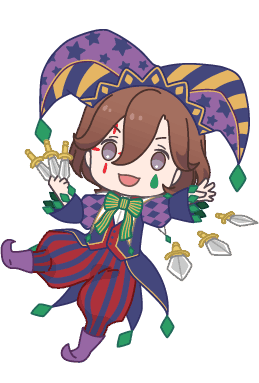
Reiji is a court jester who loves, loves, loves nothing more than to make you smile! Much of the court takes his good cheer for granted, and even more underestimate his prowess in tough/delicate situations, but the most powerful folks know he’s just as sharp as he is goofy. When he’s not doing his job making people smile, he’s often helping or promoting his family’s pub or bugging his friends from outside the royal court. His flashy performances and maraca-shaking have been shaped into a great conduit for spells of transmutation, though he tends to use them to put on a great show more than beat ass.

Ranmaru is the eldest son of the disgraced Kurosaki nobles (whose power and legacy were ruined by the Jinguujis and Hijirikawas as per usual) but he decided to bear the brunt of the damage in wake of his father’s passing to spare the rest of his family. Shouldering massive debt, Ranmaru disappeared and re-emerged as the gambler prince of the underground, now incredibly powerful in his own right. Not-so-secretly a big softie, he’ll swindle and ruin the lives of those who take advantage of the helpless, even operating out of a pub owned by an old couple that needed some protecting from loan sharks. Ranmaru wears special runed gloves that store mana when he plays his bass, letting him cast a set number of fire evocation spells before his next recharge.
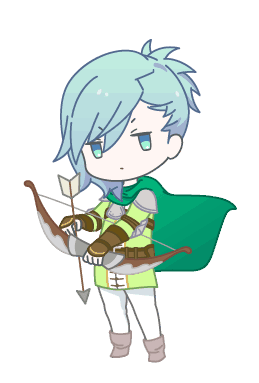
Ai lives in woods on the outskirts of the city. Most regard him as a hermit, but a couple know that Ai is actually a homunculus that has been refining his understanding and performance of humanity and needs frequent breaks to “recharge.” Nominally a ranger, Ai’s skills lie in his powerful patience and observation moreso than his bow and arrow, though he and Reiji have an arrangement where he helps hunt and forage ingredients for the Kotobuki pub. Ai is beginning to grasp his own unique sense of humanity and is ready to take grander action to realize it. He fights with arrows of a special alloy that react to an instrument at home; they are tempered by the sound and blessed by the wind to never miss their target should the wielder be skilled enough.
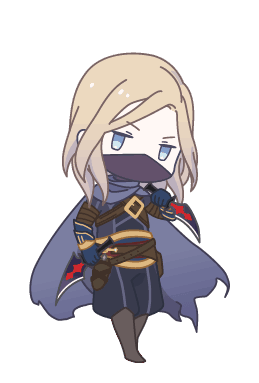
Camus is an assassin that lives in shadow. Nobody’s quite sure of his intentions or allegiances, but the few times someone does see him in the open, he’s as haughty and demanding as ever. Rumor has it that he lives in the royal castle -- certainly, their enormously increased sweets output would imply such, and it’s well-known in the castle that unexplained cello music is usually his doing -- but he’s such an evanescent and terrifying presence nobody’s quite sure (and is too scared to ask). His assassinations are almost impossible to track, as his blades of ice melt, disappear, and leave no trail to follow.
Typical route stuff goes as you’d expect -- you progress the plot, you get closer to your chosen boy, some political intrigue things probably happen, some heart-racing events etc. etc., and before you know it the two of you are very close and realize that your arts cast wildly powerful magic when put together. Slowly, you gather more friends (a selection of the other boys + Haru and Tomo) and find that together, your work amplifies in power to unprecedented degrees. It’ll vary from route to route how you get there, but eventually, you all come to the same conclusion: it’s time to kick some demon king ass. And you do!
The ends vary from angsty (like the player or the chosen boy is mortally wounded or dies) or fairytale fluffy (go off and spend a happy life together) or something more power fantasy-feeling (like you and chosen boy revolutionize the whole kingdom for the better in wake of the demon king’s defeat), etc. -- but no matter what you know that your art + your boy + the power of friendship kicked more ass than anything Shining Kingdom has ever seen!
72 notes
·
View notes
Text
MY OPINION ABOUT ENDGAME
I’ve written this nice long YouTube comment about Endgame, and it contains pretty much everything that I think about that movie, so I’m just going to copypaste it here. Because of the subject of the video, a lot is about Steve/Bucky not becoming canon and what happened instead.
Spoilers after the break.
Ok, I don't care, I have OPINIONS and need to share them somewhere.
1) Stucky was never going to be canon and I think most of us are adult enough to admit that. HOWEVER what the movie did in general felt as if it would ignore everything we know about Steve, Bucky and Peggy.
- Did they keep Steve and Bucky apart? Totally.
- Steve ending up with Peggy. Would have been nice, IF that was where they had been going since 2011. It is not. They had a movie together where they have some flirting going on (a lot less than other superhero love stories, if you ask me, but shipping googles, don't ask me). After that, Peggy got an entire season about mourning Steve and slowly accepting his death, and a second where she started dating again, and Steve two plus movies where his motivation was mostly "OMG, Bucky is alive" and "I need to protect Bucky". THEY BOTH MOVED ON. This felt like a last minute "let's do something that gets Steve out of the way and will count as a happy ending".
- Steve living in the past. Ok, ok, ok, this is a BIG one for me. As many others have pointed out, he is now in a time where he full well knows Bucky is being held prisoner and tortured, and it's either letting it happen or key points in history will change. He is also watching SHIELD being founded and recruiting former HYDRA agents, as consequence of which PEOPLE WILL DIE, and Steve knows that, because HE'S BEEN THERE. Is he just going to sit there and let it happen??
Also, if we are already at it: Imagine the following scenario. It is the early 50s and Steve Rogers has just returned from the future (2023, right?) to spend the rest of his days with the love of his life, Peggy. Segregation is still a thing. Residential schools are still a thing. Women don't have the same rights as men. Queer people don't have any rights, period. Disabled and mentally ill people are being constantly mistreated, part out of ableism and part out of genuine ignorance in the medical field. The US is in cold war with the Soviet Union, and both sides do stuff that are not ok, and also highly classified. Steve, having lived in the future knows about them because it's history. Should I continue?
We normal people would maybe play the well-behaved time traveller and sit around waiting for history to happen, BUT NOT STEVE ROGERS. He is famous, and very influential because of his status as Captain America, and he has got a significantly smaller tolerance for bullsh*t than the other people in his time, because he has seen a world that is more accepting. He is going to try to fight everything at once. This is going to be chaos.
- Finally, and I haven't seen this pointed out yet, but HOWARD. Steve just returned to a time when Howard Stark was still the Howard Stark we know from The First Avenger and Agent Carter. A little weird and egocentric and visibly ND, but all in all a nice guy. I don't even know where to start with how much chaos this is going to cause. The memory of Steve Rogers has been a driving force behind Howard's entire life. Having him actually BE there will 1) prevent him from idolising him, and 2) Steve will be able to say little things to him like "Howard, you really have got a nice son there, maybe you could spend some more time with him?". Will Tony without his abusive childhood still become Iron Man? I think so, yes. Will it still completely change who he is as a person? Also yes...? Don't even mention that Steve perfectly knows how Howard and his wife are going to die, namely assassinated by Bucky, because...
(Also, remember Agent Carter season 1 when Howard openly told Peggy tat he'd been in love with Steve? Yeah, that is going to be a fun discussion when they announce their engagement. Seriously, someone should write it.)
Conclusion: While I understand how the idea of Steve returning to Peggy might have sounded good on paper, the writers just didn't think it through and as a consequence, it feels rushed and as if they'd just butchered not only one, but at least three or four of our beloved characters and their story arcs.
2) My opinion about Endgame was that it was nice. But definitely not good or something I'd want to rewatch anytime soon.
- It bit off more than it can chew. One movie to close off six character arcs is not enough by far. They should have made at least three. One for Steve and Tony, one for Clint and Natasha, and one for Bruce and Thor.
-> Tony's character arc was the one I was almost completely happy with. Minus the Pepper wearing the suit bit, which I feel should have been a big emotional moment but instead was just kind of there and came a little out of nowhere. Steve, see above, would have needed either a different ending or a whole lot more thought in it.
-> Clint becoming a pretty terrible serial killer was just somehow never dealt with?? Because THAT? That would have needed a complete movie to make sense and to give him time to actually redeem himself. Natasha... Redemption equals death. I'm not a fan of that trope, especially because she already seemed to have redeemed herself at that point? She didn't need to die? Also, fine, I get why it could make sense, but killing off the one female protagonist these movies had for quite some time feels really, really... It makes me feel cheated. Given more time, they could have developed the whole arc better.
->Bruce making peace with the Hulk IS exactly what should have happened to him. HOWEVER, it all happened in that short moment when the screen was black and read "five years later". That is... Not what I'd call good character development. Again, this would have needed TIME. Give him a movie. Combine his story with that of Thor. Could have been great.
-> Thor. This is the one that makes me just ANGRY, so I'm giving it it's own bullet point. Look, what happened to him completely makes sense. It also feels as if the movie hadn't taken him and his pain seriously. Like that scene in his cabin, that was totally played for laughs, and after that, they just didn't give him enough time. And I get it, there WAS NO TIME. There was just too much going on.
But people, alcoholism and PTSD are SERIOUS subjects, and if you want them there, you need to commit to write them properly. Marvel can do that, as they have proven with their Demon In A Bottle storyline, Iron Man 3 or The Incredible Hulk episode Alice In Discoland. But these are all separate stories that revolve around these themes. There is no way someone could manage a nuanced and sensitive representation in an ensemble movie that also juggles at least eight other characters and aims to close off eleven years worth of movies. There is just not enough time.
So what they should have done instead: Either make Endgame three movies, and give Thor and Bruce one where they can support each other while dealing with his trauma and the Hulk, or just leave out the entire arc. Thor's arc was finished in Thor: Ragnarok. He became king, learned to accept that his father had done many bad things and made peace with Loki. They should have left it there and only used him to drive the action forward instead of trying to have him evolve in any direction.
(In this version, the massacre at the beginning of Infinity War shouldn't have happened. Give them some more time to arrive on Earth, and than call Thor and Bruce away to fight Thanos while Loki is benched because the Asgardians need an acting king. Thor behaves more or less the way he did in Ragnarok, goes on his quest to get the axe, and Endgame is just plain different.)
- While I do enjoy a good "everything is bad AU", Endgame didn't make it work. Probably because they messed up the characters part.
- Nice call backs, though. Especially the one when they redid the Star Lord dancing in the cave scene, and than cut to Rhodey and Nebula watching him looking like a complete idiot. :D I really liked that one.
- Good action scenes. The end fight when all the dusted heroes came out of the portal and they were these dark silhouettes with a bright light behind their backs! Wheeeeeeeeeeee!!!
Conclusion: Nice movie. Not a fan. Only half achieved what it set out to do.
9 notes
·
View notes
Text

This is a review of the 2002 novel, ‘The Assassins of Rome,’ by Caroline Lawrence, the first in her Roman Mysteries series.
Have I mentioned that I love edutainment? I don’t even care that this is a children’s book. We’re doing a full review. Plus, Ancient Rome is always cool.
This book is the third that I have recently reread from Lawrence’s Roman Mysteries series. And boy did now-me pick up a lot more subtext than ten-year-old-me. This series is written by a historian, not a children’s fiction writer. And it particularly shows in these earlier books. Sitting at only number four in the series, ‘The Assassins of Rome’ is starting to find more of the balance that I remembered from the series, while still managing to find some weird deviations that probably should have been edited in better or out altogether.
The first book, ‘The Thieves of Ostia’ is quite childish. The tone was reminiscent of Daisy Meadow’s Rainbow Magic fairy series, despite the naked slave girls, revisited child’s death, tongueless beggar boy, beheaded pets, and drunken bar crawl leading to- unbelievably for a children’s book- suicide. Yes, you heard that right.
The initial mysteries are simple, pleasant puzzles. An older reader with more context might guess the answer, while a younger reader will probably learn something new. From the outset, this series showed a remarkable aversion to shying away from the confronting truth of the ancient world, while simultaneously presenting an extremely idealised view of it.
This is more marginally palatable when you understand that the primary entrant to this world is a wealthy, adventurous ten-year-old girl who immediately befriends the slave girl far from home, the ostracised religious minority and the thieving beggar boy. And yet with each advancing book, more and more nuance is introduced to these characters and our understanding of this world.
This fourth instalment is no exception. The four leads deal with more complex emotional and historical issues than ever. Characters good and bad show increasingly murky shades of grey. But the tone still struggles to walk the line between edgy and palatable the way something like Harry Potter or even Deltora Quest did.
Weird moral issues which were woefully under-addressed and confronting personal issues, particularly related to family, were bizarrely pushed aside to accommodate the main action-adventure storyline. This is even stranger in a book targeting children who are unlikely to came across mutilated beggars or the slave trade in their modern lives.
While I still love these history lessons wrapped up in mystery boxes wrapped up in children’s fiction, they are certainly less enjoyable on the reread. And yet, I still love them so much. Enjoy this time capsule back to 2002 and beyond.
2 notes
·
View notes
Photo
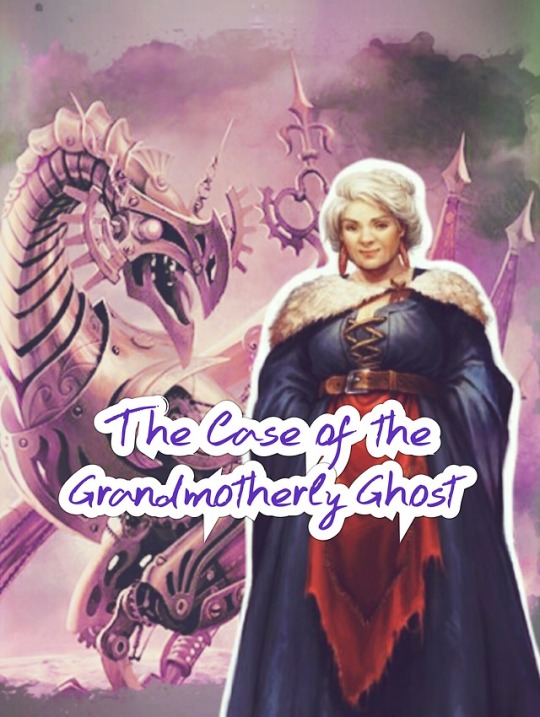
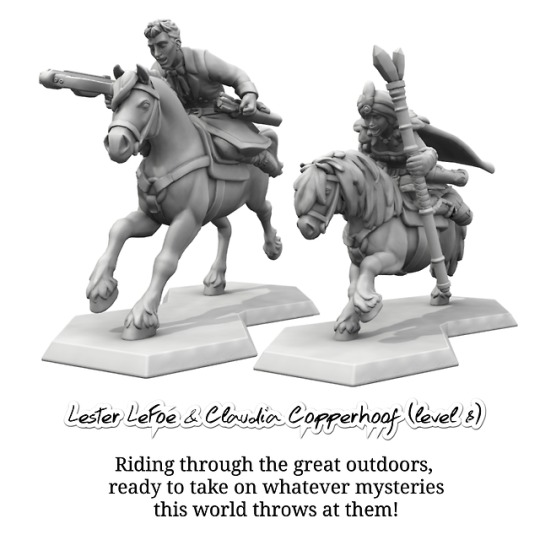
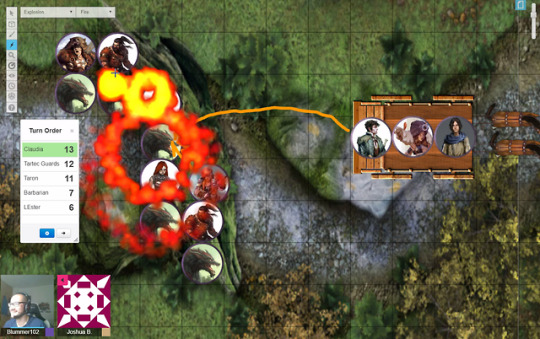
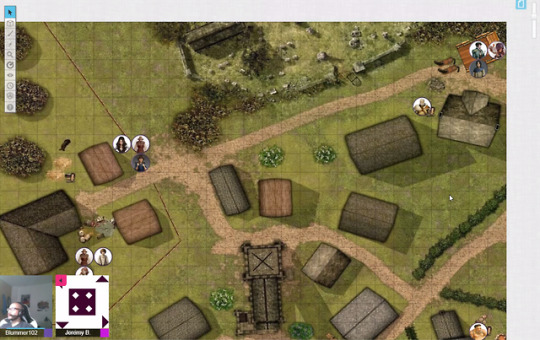


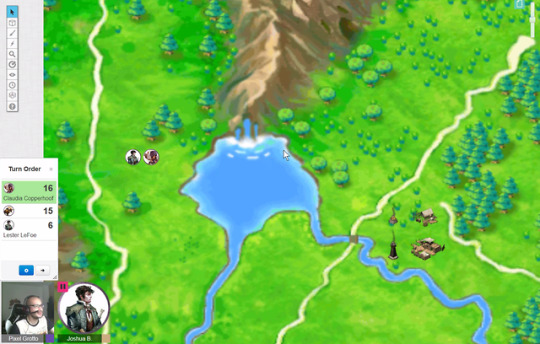
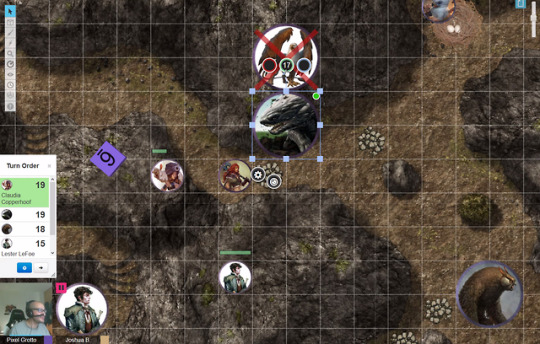
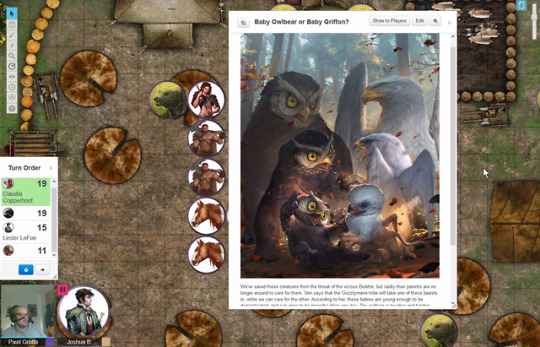
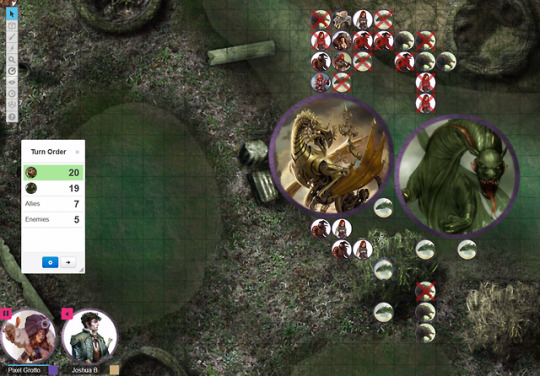
D&D With My Bro: The Case of the Grandmotherly Ghost
Last weekend my brother and I concluded our second homebrew Dungeons & Dragons campaign starring Lester LeFoe and Claudia Copperhoof, two private detectives from Tartec, a setting that my bro created for his fantasy series The Thirteenth Hour. I called it The Case of the Grandmotherly Ghost, and it was quite different in scope from its predecessor, The Case of the Almost Assassination. That first adventure was based entirely within a city and focused on our heroes preventing a political assassination, and it was much more of a Holmesian urban investigation inspired by the Professor Layton and Ace Attorney games. In contrast, the theme of this second campaign was “the great outdoors,” and I wanted to create something that gave me an excuse to use a more traditional D&D framework - that of adventurers going to a quiet village and solving problems for townsfolk. You can watch the whole adventure on YouTube here (along with our first), and I’ll highlight a few of my influences in this post, since I think it might be an interesting thought process for anyone working on their own campaign.
The hook getting Lester and Claudia to leave the capital city was the titular “grandmotherly ghost” haunting Aquaria, a small farming community. It turned out that the ghost was actually the former headmistress of the town orphanage, and she was simply trying to warn residents that the new orphanage master was a shady fellow with magic at his disposal who had secretly been brainwashing children and selling them to the barbarians of the Wild Lands, an uncharted grasslands region full of deadly beasts. And despite their seeming acceptance of slavery, the barbarians weren’t exactly bad guys either - they were more like a disenfranchised minority trying to maintain a tenuous peace with the Tartec king while fighting against a vicious sea serpent named Ungar who had recently invaded their turf. The only reason they needed the kids was to power an old steampunk robot known as the Clockwork Dragon which was the only thing capable of killing Ungar, and this gizmo had been created by a quirky wizard who loved children and made constructs that could only be used by orphans.
So in other words, there were a whole lot of twists in the plot, which started as a ghost hunt in a village but quickly ballooned into a full-out exploration of the Wild Lands and the uncovering of a conspiracy. I’ve always felt that small, so-called “idyllic” towns actually hide a lot of creepy secrets behind an illusion of peace, and my character, Claudia, even comments on this at one point, talking about how cities are places where people are more likely to stab you in the open, but little villages are places where people are more likely to stab you in your sleep. Stephen King, one of my favorite authors, also subscribes to this notion, which is why he sets most of his works in weird Maine suburbs rather than cities. In interviews for Salem’s Lot, his book about vampires infesting a town, he actually mentions that if Dracula came back in this day and age and tried to take over New York City, he’d probably get run over by a car before making it very far. But a sleepy village in the middle of nowhere? He’d conquer that sort of place slowly but surely, and that’s the reasoning I kept remembering while designing both the town of Aquaria and Albertus Alright, the new orphanage master and probably the only real “villain” in our campaign, aside from Ungar the sea serpent herself.
Speaking of villains, I mentioned earlier that the barbarians who play such a large role in this story weren’t exactly bad guys. This was an important thing that I wanted to develop, because real life rarely has the mustache-twirling baddies of fiction - just people who are often radically intent on accomplishing their goals. Around the time when I was brainstorming this adventure, I was reading Scalped, which is a great comic series by Jason Aaron and R. M. Guéra about life on a South Dakota Native American reservation. It highlights the crime, corruption, poverty and preservation of cultural identity that many of these reservations grapple with, and I found this to be inspiring stuff when designing the barbarians and their Wild Land home. I basically tried to portray them as natives who’d been abused and quarantined off in a tiny area by a larger, more powerful government, which is frankly what’s happened to most aboriginal peoples across the globe, not just in the United States. Within the fantasy setting of the campaign, the big government power was the Tartec empire of King Darian IV, and there was a small segment of the barbarians - the Clawrunner tribe - who resented this oppression and ended up getting their hands on the Clockwork Dragon, a weapon that could’ve given them the upper hand against the Tartec forces if they’d wanted to use it in such a way. Luckily, they were more focused on killing the sea serpent razing their homeland, and Lester and Claudia essentially served as neutral go-betweens, encouraging them to not engage in terrorism or cause a war that would’ve quickly gotten out of hand. If only real life could have such quick ‘n easy resolutions!
On the topic of sea serpents and mecha dragons, one of the other main tropes of traditional D&D that I wanted to inject into this quest was that of the monster. Aside from a crocodile and some snakes in the sewers, the last campaign I’d played through with my brother had mostly featured human enemies, simply because there aren’t many deadly creatures to be found within a city. (Though you could probably argue that humans are the worst monsters of all!) Venturing into the wilderness gave me the excuse to go through the Monster Manual and pull out some of the beasties that make tabletop RPGs fun, though since my brother’s world isn’t the sort of place that has humanoids like orcs, goblinkin or mind flayers, I decided to focus on the more animal-esque D&D creatures that are naturally found in forests and grasslands - stuff like the owlbear (one of my faves), the griffon, the bulette and a few mutated, more powerful versions of mammals found in our world, like rhinos and wolves. When I was designing the Wild Lands section of the adventure I also became aware of the Baby Bestiary - a wonderful series of third party D&D supplements by Metal Weave Games that provides details on younger versions of classic creatures - and I was so enamored of the concept that I wrote a turning point where Lester and Claudia can choose to adopt either an infant griffon or an infant owlbear. My brother went with the griffon, naming it Sparky, and it’ll hopefully grown to be a strong companion (Pokemon style) in future adventures.
I had one more thing I wanted to pull off with monsters in this campaign - a throwdown in the finale between the Clockwork Dragon, which could be powered by Lester, Claudia and the orphans like a medieval Voltron, and the sea serpent Ungar. This was inspired by a phase I went through about two years ago where I watched nearly all of the Godzilla movies in a row. When I finished, I kept trying to figure out how to implement kaiju battles into a tabletop RPG, because surprisingly nobody’s really done this successfully yet, though board games like King of Tokyo have come close. I finally decided that the best way to do it would be to give relatively low level playable characters temporary control of a giant beast with high level stats. So Lester and Claudia, two seventh level characters, got to choose from abilities meant for a Challenge Rating 14 dragon, giving them access to stuff like Legendary Actions and rechargeable fire breath. Their opponent was also a high level dragon with similar capabilities, and the resulting combat went better than I expected and communicated (as best as you can in a tabletop RPG, anyway) the scale and power that comes with the best big monster fights. I’ll probably end up recycling the idea again for another D&D group - in this one DM + one player game, it was just my brother controlling all of the Clockwork Dragon’s actions, but I think it would be fun with a larger group to have one player control the movement, one control the attacks, one the Legendary Actions, etc.
All in all, The Case of the Grandmotherly Ghost took about 11 sessions and 24 hours to complete, which is roughly on par with The Case of the Almost Assassination. 20-30 hours seems to be the amount of content that I subconsciously end up creating when I design a campaign, which is interesting, because about four years ago on this blog I wrote (in a poorly written fashion, I now find) a post about how 30-ish hours is probably my ideal length for a gaming experience. The next adventure my bro and I will be embarking upon with Lester and Claudia - The Case of the Troubled Territory - might end up hitting that mark as well, though I do plan to experiment and hopefully make it more open-ended than this past one, which checked off most of my bullet points but was slightly too linear at moments.
At any rate, now that we’ve conquered the great outdoors, the theme for the next quest will be “Arabian Nights!” Who knows what future rolls lie in store for our heroes? Expect another campaign deconstruction in…five or six months time, hopefully!
#pixel grotto#musings#video games#dungeons & dragons#dungeons and dragons#d&d#dnd#d&d 5e#5e#roll20#roll 20#tabletop gaming#roleplaying game#rpg#the thirteenth hour#thirteenth hour#phoenix wright#ace attorney#professor layton#layton
4 notes
·
View notes
Text
Assassin’s Creed Origins: It’s Fine
Hey! Another sorta game review-ish thing.
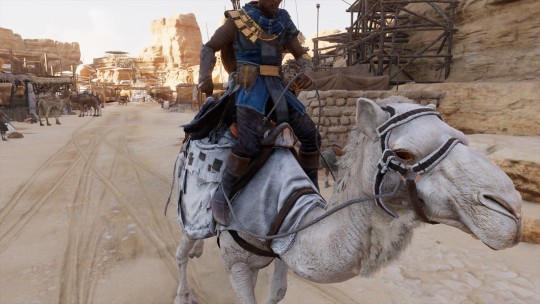
Assassin’s Creed Origins is a perfectly fine game. It’s got some incredible scenery, some decent writing here and there, but the core gameplay is a bit lacking. It’s a problem with AAA games in general, and more specifically the type of open-world games that Ubisoft develops.
First off, the good stuff: This game is absolutely gorgeous. You could generalize it as all deserts and farmland, but it does an incredible job of adding variety to that basic formula. Every region looks different, every little town has its own thing going on, every nook and cranny feels intentional. Even without being able to run it at max settings, I am often blown away by how good it looks. And it has a good photo mode, which is always fun.
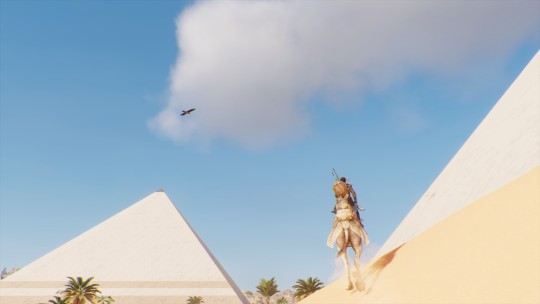
The writing is kind of a mixed bag. A lot of quests feel like pretty thing excuses for going to a place and murdering people, or finding some sunken treasure, or what-have-you. But the protagonist, Bayek, is very well-realized. I enjoyed how he was written to be kind of a goofball, and he felt more like an actual member of the society he was in than most AC protagonists. I like that they are consistent about him believing that vengeance is good, actually, and you should take it if you can.
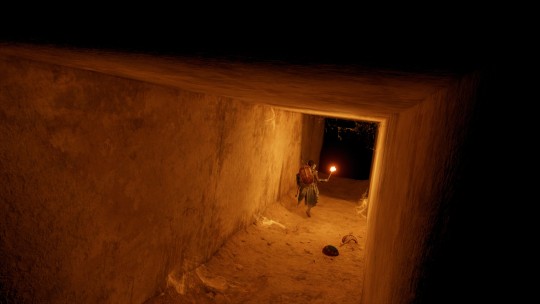
So, the gameplay. Climbing on stuff is as good as it’s ever been, though it is occasionally frustrating when Bayek cannot climb something that clearly has cracks he could use as fingerholds. This is the thing that’s been polished to a mirror sheen over the course of this long series, the main appeal from the very beginning. Even in the largely rural setting of Ptolemaic Egypt, there are plenty of temples and ancient ruins to clamber all over.
The combat sucks. It’s trying to add a more Dark Souls or Witcher-ish dimension with the shield, but it doesn’t really work. It ends up being the same old thing, you get enemies in combos until their health goes all the way down. Sometimes, tougher enemies have big shields, and you gotta charge up a stronger attack to get past it. The only times I’ve died in combat are from being lit on fire and not noticing my health dropping in time to jump in some water or roll around on the ground.
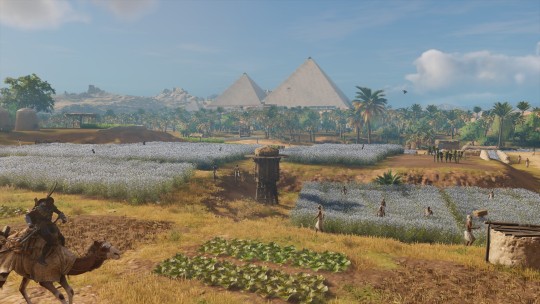
Part of the problem is that there is no enemy variety to speak of. This is a common problem in these types of open world games. You get the vague categories, which are then translated exactly into each faction. They may have different tricks up their sleeves, but it has never been relevant.
This is the essential problem with the game: it’s too easy. It’s designed to be beaten, you’re not supposed to ever struggle while playing it. The method it uses to entertain you is passive, not active. You are not engaging in the world directly, it’s more like seeing it from a thousand feet in the air. Oh, there are farmers in the fields, doing their work. Oh, there are greek soldiers, roaming the countryside. You only interact with the world through side quests, and even then it is all proscribed, pre-written dialog, pre-determined action. Bayek is on his journey, you’re just watching it.
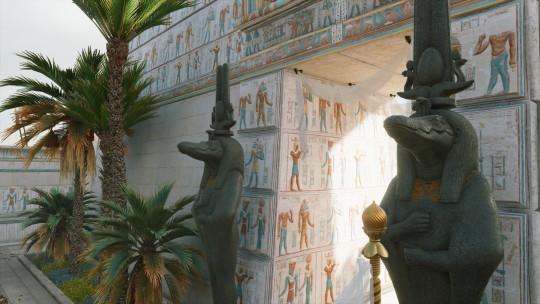
So, overall, it’s a great game to play while listening to podcasts, but it gets a bit boring after a while. The only thing it really has going for it is the variety in scenery, which, again, is really incredible. Maybe my expectations were built up a bit high by all the talk I heard about it last year on podcasts and social media, but I expected something really different, a new direction for the series. But really, it’s essentially the same.
Playing this game, I keep thinking how much potential it has, squandered. All this work put into the world, getting it to look so incredible, and you just wander around climbing on stuff and murdering people. They keep trying to make something new by bolting things onto the formula established in the very first Assassin’s Creed, but they’ve never really succeeded.
I started playing this game right after finishing Dragon Quest XI, and I was struck by how loose it felt. Animations are approximated to what they’re supposed to do. Every sword hit may not exactly connect, but you know what the animation is implying, it’s fine. People clip through clothes, animals clip through riders, everything is always bouncing and colliding at odd angles. Nothing is exact, it’s all just close enough to how it needs to be.
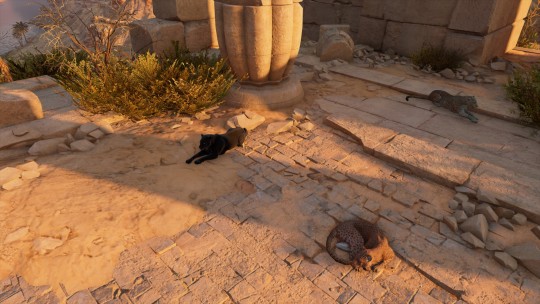
This is in contrast to DQXI, which was very exact in everything. Animations in battles lined up perfectly. Camera angles were chosen carefully to always show things at their best. Models are constructed to never clip or bend in weird ways. There are no relevant physics to speak of, besides the ability to jump, which is carefully limited as well. There are lots of invisible walls to keep you from getting into awkward places you shouldn’t be.
It struck me how both games were trying to simulate a world, but with very limited scope to tell a particular story, and yet they ended up feeling so incredibly different. There seems to be a tendency in big western RPGs to try to simulate the world, and then figure out what story you want to tell in it. If you can just get all the pieces working right, then you can figure out something interesting to actually do with them afterwards. Whereas in JRPGs, you get the opposite, you figure out the story and then see what bits of the world actually need to be simulated.
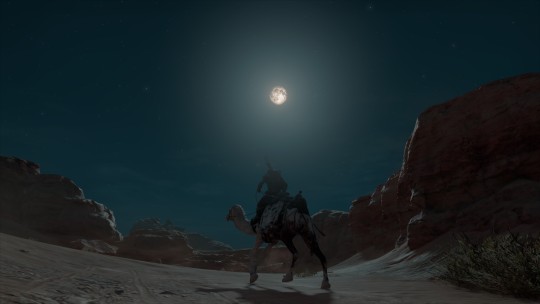
The latter gives you a much tighter, more focused experience. Not to say that one is better than the other, necessarily, it’s merely an interesting juxtaposition, starkly demonstrating the divide. And it goes WAY back, to the earliest examples of both genres. Look at Daggerfall, with its hundreds of square miles of simulated countryside. Compare it to Dragon Quest 5, which was exactly as big as it needed to be to accommodate the story it wanted to tell.
#assassin's creed origins#game review#my writing#bayek#got a little ramble-y in this one but whatever#it was fun to write#review#long post
9 notes
·
View notes
Text
Never Have I Ever
A Peter Q/ Tony/ Bucky AU in which they play NHIE at a party. Hence the name of the ficlet lol. (Also this was written on my phone if formatting gets weird I’m sorry 😭😭.
***
“Okay,” Tony says as he sits down. “We’re playing never have I ever hard edition. No mention of sex, drugs, or alcohol,” he tells the group. Everyone groans but it’s Clint that says what they’re all thinking.
“Dude, what the hell? That’s literally the whole game.”
Tony rolls his eyes, “well it gets fucking boring when you used to do a shit ton of drugs, had a lot of sex, and used to be an alcoholic. I’m tired of drinking like five jugs of apple juice because thirty five years of life hasn’t resulted in a single one of you finding a drinking game fifteen year olds don’t play. Also Peter used to deal drugs so he ends up taking way too many shots and I worry about his body’s tolerance, and Bucky is asexual so he’s fucked out of ninety percent of the game. No pun intended,” he adds when he realizes how that sounds.
“I’m asexual and I have no problem playing this game,” Sam mumbles, glaring at Bucky.
Bucky flips him off, “oh fuck off, just because you’re slutty doesn’t mean the rest of us are.”
“Don’t be rude,” Tony tells them.
“No, fight, I want to see which one of you wins!” Peter says excitedly. Tony gives him a look a but it doesn’t seem to curb Peter’s enthusiasm.
“Fine,” Natasha mumbles. “Never have I ever kicked a dog,” she says.
Steve takes a guilty shot and they all frown at him. Tony would have guessed Peter if he guessed anyone. “I was running late for work so I was trying to hurry and the dog wasn’t there and then it was and I almost died tripping over it,” he says, staring at the table.
T’Challa pats his back, “I don’t think that counts,” he says sympathetically.
“No,” Steve mumbles. “It counts.”
“If it makes you feel better cats are the superior animal,” T’Challa offers. It doesn’t seem to help.
“Birds are the superior animal,” Sam says. “Specifically falcons, none of this budgie apologist shit.”
Clint flips Sam off, “fuck you, hawks. Ok then. Never have I ever laughed so hard I threw up.”
Everyone but T’Challa takes a shot. T’Challa looks mildly horrified. “Um. Never have I ever punched an extremist,” Tony says, trying to find something ridiculous that he hasn’t done. He’s unsurprised when Steve takes a shot, when Bucky takes a shot he wants the story, but when Peter takes a shot he really wants the story. That disappears when T’Challa tentatively takes a shot too. They all stare at him and he sighs.
“Wakanda has a problem with an extremist group of isolationists and one time I got fed up and punched my former best friend. In my defence he tried to assassinate me,” he says and all their eyeballs just about pop out of their heads.
“Dude you’re a badass!” Peter says.
“What’s your story?” Bucky asks him.
He shrugs, “asshole drug dealer who was also a white supremacist, not nearly as fun as fun as T’Challa’s but there was two million dollars of meth so I feel like I should earn brownie posts,” he says.
Steve blinks rapidly, seemingly unable to process that. “What do you even do with all that meth?” He asks
Peter squints, “sell it, dumbass.”
“What about you?” Tony asks Bucky to break the tension.
He sighs, “I saw a guy with a swastika tattoo and panicked. I’m a gentle Jew and I was threatened. Ok so I instigated the fight but still.”
“Are you talking about Schmidt?” Steve asks. Bucky nods. “Fuck that guy, he was a piece of shit.”
“Well I guess he deserved it,” Tony mumbles.
Sam squints, “the swastika didn’t tip you off?”
“Some people make dumb mistakes,” he says even though that’s an admittedly extra dumb mistake to make. Like unfathomable, really.
“I swear to god if you have a swastika tattoo...” Sam mumbles.
“He doesn’t,” Bucky says. “I’ve seen every inch of his body, including inches he probably wouldn’t want me to see.”
Tony frowns, “what’s that mean?”
“It means your booty hole isn’t pretty,” Peter tells him bluntly. “What, don’t look at me like that. No one has a pretty booty hole.”
“Ok Natasha is glaring at me we’re moving on. Never have I ever been abducted by aliens,” he says no no ones surprise. Bucky and his fucking conspiracies. Dude has an obsession.
When Peter takes a shot though they all squint at him suspiciously. “What? Like I wanted to be abducted after my mom died. That big blue bastard was an asshole. He was always ‘when I picked you up on terra my boys wanted to eat you, they ain’t ever tasted no Terran before. But I stopped them-‘ it continued for a bit but I tuned it out and eventually they decided I was useless and dropped me off in Medicine Hat, Canada. Yeah, that’s a real place.”
“Medicine Hat was the most believable part of that,” Sam tells him, frowning.
Bucky laughs, “that was some world class meth, Peter.”
Peter squints, “drug dealer 101- don’t fucking smoke your supply. Also I was nine, nine year olds don’t- okay most nine year olds don’t sell drugs,” he says. “Or do them,” he adds.
T’Challa looks horrified, “you knew nine year old drug dealers?” He asks.
Peter shrugs, “I was into some shady shit.”
“This country is in peril,” T’Challa mumbles.
“Ok chill it black panther the youngest dealer I knew was 13 but they probably go younger, I don’t know, I refused to deal with anything that wasn’t in the double digits,” Peter says like this is an improvement. “But back to this seriously bullshit game that obviously displays our total lack of creativity. Never have I ever eaten out of the trash.”
Bucky takes a shot and everyone makes a disgusted face. When Clint takes a shot no one reacts. “How come you guys think I’m gross but Clint isn’t?” He asks.
“We expect you to have standards,” Tony says. “Please don’t kiss me with your garbage mouth.”
“Seconded, I love you but fuck that noise with something hard and prickly,” Peter says.
“Don’t look at me like that! People throw away perfectly good food away in your neighbourhood, it’s a fucking sin to let that go to waste,” Bucky tells Tony.
Tony sighs, “you’re the one the homeowners association keeps whining about,” he mumbles more to himself than Bucky.
“Alright Bucky nope, can’t do it, I gotta dump you,” Peter tells him.
Bucky looks offended, “I didn’t dump you for claiming to be abducted by aliens!” He says
“Aliens that are inexplicably from the southern United States if that speech pattern is any indication,” T’Challa adds.
“That’s a real story! His name was Yondu and he was the ugliest sonofabitch I’ve ever seen,” Peter tells them. “Except maybe Taserface, he looked like uglier Hagrid.”
Sam throws his head back and laughs with the rest of them. “Taserface? What the hell did nine year old you drink?”
“Why did he name himself after a human weapon?” T’Challa asks.
“Also how come these aliens seem to follow the human gender binary?” Steve asks.
Peter rolls his eyes, “I was nine, assholes. I wasn’t about to sit down and have a fucking discussion about gender theory with a blue fuckstick making vague threats about letting his crew eat me. I was shitting my damn pants.”
“Who thinks this is a more dumpable offence than liberating food from rich people’s trash?” Bucky asks. Everyone but Clint raises their hands. “Clint doesn’t count because he’s gross,” Bucky says. “So everyone has voted that you shouldn’t dump me,” he tells Peter.
“That’s not at all what we just voted but fine. Canada is a fake country also, Medicine Hat can’t be a real place,” Peter says.
“I remember why we play this stupid ass game now,” Tony says.
“So I can find out I choose to waste my precious time with two dumpster divers and a man who claims and alien named ‘Taserface’ abducted him?” T’Challa asks. “Don’t look at me like that, I’m a prince. My time is precious, that is an objective fact.”
“Yondu abducted me, Taserface was just there,” Peter corrects.
“I’m dating two out of the three mentioned people. How do you think I feel?” Tony asks. “But no, it’s because we all have ridiculous stories we’d never tell unless asked and this game never fails in its quest to make us reveal dumb obviously made up alien stories.”
“That was real!” Peter says in his own defence.
“Sure honey,” Bucky tells him, patting his thigh.
#peter x bucky x tony#alternate universe#fanfiction#my writing#crack fic#isk bois inspiration hit and this is the result
14 notes
·
View notes
Text
Morrowind Tribunal: Bad writing?
I recently re-did the Tribunal main quest and refreshed my memories about the events and since my friends, who I spammed about this, don’t actually play any TES games, I thought I might share my thoughts here in hope someone would be willing to share there thoughts on this with me in return. Let me start this with confessing that I have a huge crush on Morrowind’s new King Hlaalu Helseth, but not everyone feels the same way about him. I can see why a person who tries to kill you at least 3 times, a ruthless manipulator and deadly alchemist who could teach Molag Bal how to scheme, wouldn’t be so popular. But in the Tribunal main quest you still have to side with him.
Even if you don’t do the quests from his right-hand man, the story forces you to take his side at one point. quick summary: You need the weapon of his champion and said champion will not hand it over to you unless you agree to be Helseth’s spy. Now what I want to discuss is, why? Actually being a spy for Helseth doesn’t change anything, since it only pays off after you defeat Almalexia (thus ending the main quest), which, depending on when you did the “Helseth’s champion” quest, can involve multiple quests between.
You being a spy doesn’t alter any of them. The funny thing is also that if you did the “Make sure Helseth doesn’t have any enemies” quests at the start, you get told by Barenziah to do the quests for the temple and working for them, just so that you can end up at Helseth’s side again later. And it’s that switching of sides for apparently no reason that makes the overall story feel really weird, especially because you aren’t really given a reason as to why you have to side with Helseth in the end. I mean sure, Helseth is way better choice than Almalexia, but you don’t actually find that out until right at the end when she tells you that. So when you side with Helseth, it’s not because you don’t trust Almaleixa, it’s because he doesnt trust her and thinks she’s evil. And...I hate to admit it, but I feel like Skyrim’s DLC Dawnguard made a better storyline about two opposing sides. (Skyrim having a better written plot than Morrowind, what a paradox!) You either side with the vampires or you side with the vampire hunters, altering the main quest in places and adding unique quests to each faction. But even if some parts of the main quests are altered depending on your choice, the overall story is the same - Harkon is the evil guy that needs to be defeated, whethre you sided with him or not. I feel like Tribunal could have been better, if it had a similiar structure - you actively choosing to side with either the temple or Helseth, without switching sides from one quest to the other. Imagine, you decide to side with the temple and do the quests that are anti-Helseth, + adding a way to aquire the piece of the Blade from Helseth’s champion that doesn’t involve becoming Helseth’s lackey. Not actively involving Helseth at all afterwards perhabs, just like how the Dawnguard doesn’t get involved heavily the moment you choose to be a vampire in the Skyrim DLC. Or you side with Helseth, adding something that would actually make a player want to do that, because you know, he tried to kill you. I mean something like him actually making up for that or simply offering you more than the temple does, actually convincing you that Almalexia shouldn’t be trusted anymore. You know, just make the guy a bit more likable, or at least give good reason early on why he has a point. You don’t really get sympathy points when the first interaction you have with someone involves an assassination attempt, okay? (unless this someone is me, but whatever) And than you can be his spy and do the temple quests that lead up to the final confrontation with Almalexia. That all being said, I still feel the need to actually defend the Tribunal questline we got at the end, if one can look at it from a different perspective. As I said, there isn’t much about Helseth or anything he does and says that would make someone actively side with him and if the game didn’t force us too, I doubt many people would. This doesn’t have to a be writing fail though, as it could exactly what the writers wanted - the player not having a choice. Actively being manipulated by a King so you do his bidding and help him get rid of his foes, so he can actually rule as the King of Morrowind. Afterall, if you ask the people from the temple what they think of him, they say that they dislike him, because he tries to actually do something as the King, while before it was a nothing-title. The previous King was a fool who never did anything, Helseth is not and he does strive for power and to have say in Morrowind’s future. When you as the player defeat Almalexia, the Tribunal is almost destroyed and with them the ruling force of Morrowind, giving Helseth more power (He really does significant stuff as the King afterall, like making the grand council a thing again and abolishing slavery. I doubt he could have done that, if the Tribunal was still in charge). Plot- and lore wise it’s basically a story about Helseth manipulating the hero in order to gain more power and for that you actually need to work for him at one point. And you got no choice than to be used by him for his own personal gain. You might be the Nerevarine, savoir of Morrowind, but he still got you in his strings. Now this is close to the Dragonborn DLC of Skyrim - the one person who benefits from the entire plot is Hermaeus Mora. You can totally despise him and actively tell him that too, but it doesn’t change the fact that you work for him at the end, doomed to take Miraak’s place while Hermaeus Mora not only got a new dragonborn servant, but also the Skaal knowledge he was after. You can’t oppose him and the story makes that clear - you have to sacrifise yourself for Solstheim because you need the help of a daedra prince who is also a fucking dick. And this is what I think they were going for in Tribunal: Helseth is a fucking dick who wants to kill you and only when that fails thinks “Well they might actually be useful for me, gotta manipulate them somehow.”, but in order to fulfill the main quest, you need his help regardless of what you think of him. He might be the villain in any other szenario, but in this context he’s the lesser evil compared to the other person, who really needs to be stopped, since they would cause way more harm. He have to side with the evil King to defeat the evil Goddess, who will wreck way more than the King ever could. And also quite nice is the notion that you, while being the most powerful person out there, are just a tool for another one, a person who has the might to say: “What are you compared to me?”
#Morrowind#the elder scrolls#tes#skyrim#dawnguard dlc#dragonborn dlc#miraak#tribunal dlc#almalexia#hlaalu helseth#hermaeus mora#discussion#skaal
9 notes
·
View notes